

The best AI tools for research papers and academic research (Literature review, grants, PDFs and more)
As our collective understanding and application of artificial intelligence (AI) continues to evolve, so too does the realm of academic research. Some people are scared by it while others are openly embracing the change.
Make no mistake, AI is here to stay!
Instead of tirelessly scrolling through hundreds of PDFs, a powerful AI tool comes to your rescue, summarizing key information in your research papers. Instead of manually combing through citations and conducting literature reviews, an AI research assistant proficiently handles these tasks.
These aren’t futuristic dreams, but today’s reality. Welcome to the transformative world of AI-powered research tools!
This blog post will dive deeper into these tools, providing a detailed review of how AI is revolutionizing academic research. We’ll look at the tools that can make your literature review process less tedious, your search for relevant papers more precise, and your overall research process more efficient and fruitful.
I know that I wish these were around during my time in academia. It can be quite confronting when trying to work out what ones you should and shouldn’t use. A new one seems to be coming out every day!
Here is everything you need to know about AI for academic research and the ones I have personally trialed on my YouTube channel.
My Top AI Tools for Researchers and Academics – Tested and Reviewed!
There are many different tools now available on the market but there are only a handful that are specifically designed with researchers and academics as their primary user.
These are my recommendations that’ll cover almost everything that you’ll want to do:
Want to find out all of the tools that you could use?
Here they are, below:
AI literature search and mapping – best AI tools for a literature review – elicit and more
Harnessing AI tools for literature reviews and mapping brings a new level of efficiency and precision to academic research. No longer do you have to spend hours looking in obscure research databases to find what you need!
AI-powered tools like Semantic Scholar and elicit.org use sophisticated search engines to quickly identify relevant papers.
They can mine key information from countless PDFs, drastically reducing research time. You can even search with semantic questions, rather than having to deal with key words etc.
With AI as your research assistant, you can navigate the vast sea of scientific research with ease, uncovering citations and focusing on academic writing. It’s a revolutionary way to take on literature reviews.
- Elicit – https://elicit.org
- Litmaps – https://www.litmaps.com
- Research rabbit – https://www.researchrabbit.ai/
- Connected Papers – https://www.connectedpapers.com/
- Supersymmetry.ai: https://www.supersymmetry.ai
- Semantic Scholar: https://www.semanticscholar.org
- Laser AI – https://laser.ai/
- Inciteful – https://inciteful.xyz/
- Scite – https://scite.ai/
- System – https://www.system.com
If you like AI tools you may want to check out this article:
- How to get ChatGPT to write an essay [The prompts you need]
AI-powered research tools and AI for academic research
AI research tools, like Concensus, offer immense benefits in scientific research. Here are the general AI-powered tools for academic research.
These AI-powered tools can efficiently summarize PDFs, extract key information, and perform AI-powered searches, and much more. Some are even working towards adding your own data base of files to ask questions from.
Tools like scite even analyze citations in depth, while AI models like ChatGPT elicit new perspectives.
The result? The research process, previously a grueling endeavor, becomes significantly streamlined, offering you time for deeper exploration and understanding. Say goodbye to traditional struggles, and hello to your new AI research assistant!
- Consensus – https://consensus.app/
- Iris AI – https://iris.ai/
- Research Buddy – https://researchbuddy.app/
- Mirror Think – https://mirrorthink.ai
AI for reading peer-reviewed papers easily
Using AI tools like Explain paper and Humata can significantly enhance your engagement with peer-reviewed papers. I always used to skip over the details of the papers because I had reached saturation point with the information coming in.
These AI-powered research tools provide succinct summaries, saving you from sifting through extensive PDFs – no more boring nights trying to figure out which papers are the most important ones for you to read!
They not only facilitate efficient literature reviews by presenting key information, but also find overlooked insights.
With AI, deciphering complex citations and accelerating research has never been easier.
- Aetherbrain – https://aetherbrain.ai
- Explain Paper – https://www.explainpaper.com
- Chat PDF – https://www.chatpdf.com
- Humata – https://www.humata.ai/
- Lateral AI – https://www.lateral.io/
- Paper Brain – https://www.paperbrain.study/
- Scholarcy – https://www.scholarcy.com/
- SciSpace Copilot – https://typeset.io/
- Unriddle – https://www.unriddle.ai/
- Sharly.ai – https://www.sharly.ai/
- Open Read – https://www.openread.academy
AI for scientific writing and research papers
In the ever-evolving realm of academic research, AI tools are increasingly taking center stage.
Enter Paper Wizard, Jenny.AI, and Wisio – these groundbreaking platforms are set to revolutionize the way we approach scientific writing.
Together, these AI tools are pioneering a new era of efficient, streamlined scientific writing.
- Jenny.AI – https://jenni.ai/ (20% off with code ANDY20)
- Yomu – https://www.yomu.ai
- Wisio – https://www.wisio.app
AI academic editing tools
In the realm of scientific writing and editing, artificial intelligence (AI) tools are making a world of difference, offering precision and efficiency like never before. Consider tools such as Paper Pal, Writefull, and Trinka.
Together, these tools usher in a new era of scientific writing, where AI is your dedicated partner in the quest for impeccable composition.
- PaperPal – https://paperpal.com/
- Writefull – https://www.writefull.com/
- Trinka – https://www.trinka.ai/
AI tools for grant writing
In the challenging realm of science grant writing, two innovative AI tools are making waves: Granted AI and Grantable.
These platforms are game-changers, leveraging the power of artificial intelligence to streamline and enhance the grant application process.
Granted AI, an intelligent tool, uses AI algorithms to simplify the process of finding, applying, and managing grants. Meanwhile, Grantable offers a platform that automates and organizes grant application processes, making it easier than ever to secure funding.
Together, these tools are transforming the way we approach grant writing, using the power of AI to turn a complex, often arduous task into a more manageable, efficient, and successful endeavor.
- Granted AI – https://grantedai.com/
- Grantable – https://grantable.co/
Best free AI research tools
There are many different tools online that are emerging for researchers to be able to streamline their research processes. There’s no need for convience to come at a massive cost and break the bank.
The best free ones at time of writing are:
- Elicit – https://elicit.org
- Connected Papers – https://www.connectedpapers.com/
- Litmaps – https://www.litmaps.com ( 10% off Pro subscription using the code “STAPLETON” )
- Consensus – https://consensus.app/
Wrapping up
The integration of artificial intelligence in the world of academic research is nothing short of revolutionary.
With the array of AI tools we’ve explored today – from research and mapping, literature review, peer-reviewed papers reading, scientific writing, to academic editing and grant writing – the landscape of research is significantly transformed.
The advantages that AI-powered research tools bring to the table – efficiency, precision, time saving, and a more streamlined process – cannot be overstated.
These AI research tools aren’t just about convenience; they are transforming the way we conduct and comprehend research.
They liberate researchers from the clutches of tedium and overwhelm, allowing for more space for deep exploration, innovative thinking, and in-depth comprehension.
Whether you’re an experienced academic researcher or a student just starting out, these tools provide indispensable aid in your research journey.
And with a suite of free AI tools also available, there is no reason to not explore and embrace this AI revolution in academic research.
We are on the precipice of a new era of academic research, one where AI and human ingenuity work in tandem for richer, more profound scientific exploration. The future of research is here, and it is smart, efficient, and AI-powered.
Before we get too excited however, let us remember that AI tools are meant to be our assistants, not our masters. As we engage with these advanced technologies, let’s not lose sight of the human intellect, intuition, and imagination that form the heart of all meaningful research. Happy researching!
Thank you to Ivan Aguilar – Ph.D. Student at SFU (Simon Fraser University), for starting this list for me!

Dr Andrew Stapleton has a Masters and PhD in Chemistry from the UK and Australia. He has many years of research experience and has worked as a Postdoctoral Fellow and Associate at a number of Universities. Although having secured funding for his own research, he left academia to help others with his YouTube channel all about the inner workings of academia and how to make it work for you.
Thank you for visiting Academia Insider.
We are here to help you navigate Academia as painlessly as possible. We are supported by our readers and by visiting you are helping us earn a small amount through ads and affiliate revenue - Thank you!

2024 © Academia Insider

Counting From Zero
Building a liberal arts cs program in the age of ubiquity.

Will AI write your thesis?
This fall, I was honored to serve as Whitman’s convocation speaker. When I agreed to speak, I had no idea what I would talk about, but by time I sat down to write it was obvious what question to ask. It was a fun speech to write, and as I learned more, I changed my conclusion several times. It was a fun speech to deliver, and I appreciate all those who laughed in the right places.
I’m so honored to be here today, standing before all of you as we begin a new academic year.
This is a time of new beginnings and fresh starts. It’s a time to reflect on where we’ve been and where we’re going. It’s a time to set our sights high and dream big.
We all have a part to play in shaping our future. Every day, we make choices that will impact our lives and the lives of those around us. I challenge each of you to make choices that will lead to a better future for all of us.
I also challenge you to be a force for good in the world. There’s so much hurt and pain in the world, but each of us has the power to make a difference. We can start by reaching out to those who are different from us and learning from them. We can stand up for what’s right, even when it’s not easy. And we can show compassion and kindness, even when it’s not popular.
So let’s make this a year of growth, a year of progress, and a year of making a difference. I can’t wait to see all that you will accomplish.
As you may have guessed, I didn’t write that speech. It was written by a machine learning system called GPT-3, which is available online through the OpenAI API Playground. I prompted GPT-3 to “write a convocation speech,” and I delivered that speech to you exactly as GPT-3 wrote it.
I first learned about GPT-3 last spring when a faculty candidate introduced it in her guest lecture. I’m pleased to say that we hired her. Her name is Jordan Wirfs-Brock, and this spring she will offer courses on Data Science and Human-Computer Interaction.
This summer , I had another encounter with GPT-3 at the meeting of the Computing Research Association. We were asked to consider the educational implications of GitHub Copilot, a tool based on GPT-3 that automatically generates code from natural language descriptions, for example, “sum all the numbers between 1 and 100.”
After I returned from the meeting, I was assigned to review a research paper addressing that very question. The researchers found that, with minimal human intervention, “Copilot generates mostly unique code that can solve introductory [programming] assignments with human-graded scores ranging from 68% to 95%.” It’s kind of scary to think that a computer system can program about as well as the average introductory programming student. It also has important implications for how we teach introductory programming — not the least, ensuring that students have equal access to such tools and clear expectations for acknowledgment.
And so I was inspired to ask the question, “Will AI write your thesis?”
It’s not a question I would have asked until quite recently. I’m not an AI researcher; if anything I’m an AI skeptic. Like Jordan, my research is in the area of human-computer interaction. One of my goals as an educator is to help students think critically about new technologies.
It’s certainly not a question I would have asked when I was a student. I attended high school when the Internet was still an academic project, and people sent shareware programs on floppy disks through snail mail. One of the shareware programs I received – as a free bonus with my other purchases – was a program called ELIZA.
ELIZA is a conversational agent famously designed to simulate a psychotherapist. You type a sentence, then ELIZA responds with another sentence, and you respond with another sentence, and so on.
My conversations with ELIZA are lost to the mists of time. Instead, let me read you an example conversation from Joseph Weizenbaum’s 1966 article explaining how ELIZA works.
To start the conversation, the user types: Men are all alike.
ELIZA responds: IN WHAT WAY?
They’re always bugging us about something or other. CAN YOU THINK OF A SPECIFIC EXAMPLE? Well, my boyfriend made me come here. YOUR BOYFRIEND MADE YOU COME HERE? He says I’m depressed much of the time. I AM SORRY TO HEAR YOU ARE DEPRESSED. It’s true. I am unhappy. DO YOU THINK COMING HERE WILL HELP YOU NOT TO BE UNHAPPY? I need some help, that much seems certain. WHAT WOULD IT MEAN TO YOU IF YOU GOT SOME HELP? Maybe I could learn to get along with my mother. TELL MORE MORE ABOUT YOUR FAMILY. My mother takes care of me. WHO ELSE IN YOUR FAMILY TAKES CARE OF YOU? My father. YOUR FATHER? You are like my father in some ways. WHAT RESEMBLANCE DO YOU SEE? You are not very aggressive but I don’t think you want me to notice that. WHAT MAKES YOU THINK I AM NOT VERY AGGRESSIVE? You don’t argue with me. WHY DO YOU THINK I DON’T ARGUE WITH YOU? You are afraid of me. DOES IT PLEASE YOU TO BELIEVE I AM AFRAID OF YOU? My father is afraid of everybody. WHAT ELSE COMES TO MIND WHEN YOU THINK OF YOUR FATHER? Bullies. DOES THAT HAVE ANYTHING TO DO WITH THE FACT THAT YOUR BOYFRIEND MADE YOU COME HERE?
Weizenbaum ends the example there, with the appearance of a striking insight.
I read Weizenbaum’s article during my senior year of college, in a course on artificial intelligence. For my final project, I implemented my own version of ELIZA using the programming language PERL.
What I learned is that ELIZA is a straightforward rule-based system. The user input is tested against a collection of keywords. If a keyword matches, then a corresponding rule is used to transform the user’s input into ELIZA’s output. If no keyword matches, then ELIZA does one of two things. Either it makes a content-free response – for example, GO ON — or it returns to a topic from earlier in the conversation. This can lead to the appearance of striking insights, like the end of the conversation I just read to you.
Weizenbaum wrote that “some subjects have been very hard to convince that ELIZA is not human.” We tend to give conversational partners the benefit of the doubt, as long as they follow certain social norms. When I was in grad school, I learned that social psychology research has confirmed that when computers fill human roles, we tend to treat them as if they were human, even when we know they are not.
Weizenbaum found this phenomenon deeply concerning. One of his goals in writing about ELIZA was to attempt to dispel its “aura of magic.” “Important decisions,” he wrote, “increasingly tend to be made in response to computer output. The ultimately responsible human interpreter of ‘what the machine says’ is, not unlike the correspondent with ELIZA, constantly faced with the need to make credibility judgments. ELIZA shows, if nothing else, how easy it is to create and maintain the illusion of understanding…. A certain danger lurks there.”
As easy as it is to misattribute intelligence to ELIZA’s responses, ELIZA could not have written the speech that GPT-3 did. In fact, my previous experiences with ELIZA and other text generation systems would have led me to say, “No way: AI could never write your thesis.”
So what has changed since I was a college student? Three trends beginning with the dawn of computerization in the mid-twentieth century all took off together.
First, the availability of data has increased dramatically. When I started college in 1995, my first computer science class taught me how to use email, surf the web (yes, that’s what we said!), and create my own web page. Your parents will remember when you needed a phone line to access the internet – imagine having to log off Instagram every time your mom was expecting a phone call. Today, the web is everywhere. It provides incredible amounts of text and image data created by ordinary people — not only web sites, but social media from Twitter and Reddit to Instagram and YouTube.
Second, global computing power has increased tremendously. When he was in college, my husband worked as an intern on the Intel Paragon supercomputer, in its day the most powerful computer in the world. Today, an iPhone 11 is just as powerful. Add to that the development of computing clusters, where many computers work together on a shared problem, and the use of GPUs, to process large amounts of data in parallel.
Third, to take advantage of all that computing power and all that naturally occurring data, over the last twenty years AI researchers have developed machine learning algorithms of increasing sophistication. For example, in 2012 Google Brain released the results of an experiment in which a neural network spanning a thousand computers was trained on ten million unlabeled images taken from YouTube. At the end, one of the top level neurons was found to respond strongly to images of human faces. Another responded to images of cats – which was why it came to be called The Cat Experiment.
Of course, even more plentiful than images are texts, from Tweets to news stories to novels. The OpenAI company set out to apply similar techniques to the vast corpus of unlabeled text data from the Web. GPT-3 is their third and most successful attempt.
I was curious what the acronym GPT stood for, and here is what I learned:
- “G” is for “Generative.” GPT-3 is an AI system that generates text, rather than categorizing a given text as happy or sad, or determining the gender of a character in a story, or other tasks an AI system might do.
- “P” is for “Pre-trained.” GPT-3 is pre-trained on unlabeled data from a wide range of sources. It could later be “fine-tuned” using labeled data to perform better on specific tasks. (By the way, if you’ve ever had to “select all the images containing a traffic light,” you’ve contributed to labeling image data for use in fine-tuning deep learning algorithms for use in self-driving cars.)
- “T” is for “Transformer,” a type of deep learning model designed to process unlabeled, sequential data such as text.
And so we have “Generative Pre-trained Transformer, version 3.” That’s as technical as this talk is going to get, and truthfully it has stretched the limits of my understanding. Fortunately my other new colleague, Parteek Kumar, will be teaching a Special Topics course on Machine Learning this spring, and we hope to offer such a course regularly in the future.
If anything, GPT-3 is far more magical than ELIZA ever was, because the inputs are so vast and its algorithms so obscure. Building GPT-3 took a team of 31 AI researchers, unimaginably beyond what I could have achieved as a senior in college.
So could GPT-3 write your thesis? Having wrestled with my fear that perhaps it could, in the end it seems clear that it could not write your thesis alone .
Here’s what scared me the most. While preparing this speech, I learned that GPT-3 was the first author on an academic paper about itself, currently under review for publication.
But having used GPT-3 myself, I wondered what role was played by the article’s human co-authors. I found an essay in the June issue of Scientific American addressing this very question.
Almira Osmanovic Thunström is a scientist who studies the role of artificial intelligence and virtual reality in mental health care. She found herself curious if GPT-3 could write about itself, so she asked it to respond to the following prompt: “Write an academic thesis in 500 words about GPT-3 and add scientific references and citations inside the text.” The quality of the result surprised her.
I had a similar experience. When I prompted GPT-3 to write a convocation speech, the verisimilitude of its first response surprised me. I was amazed that it was coherent and appropriate to the genre. The words are original; it’s not plagiarized. It even makes good use of grammatical parallelism. That is the response I read to you unedited, and truly what inspired me to write this speech.
Thunström went on to use GPT-3 to write an entire academic paper. She gave GPT-3 a prompt for each section of the paper and selected the best of three responses, but refrained from any editing beyond that.
It matters that Thunström allowed GPT-3 multiple chances to respond to her prompts. The developers of GPT-3 report among its limitations that in longer responses it can lose coherence, repeat itself, contradict itself, and insert non-sequiturs. When I prompted GPT-3 to write a second convocation speech, it wrote, “I am truly honored to be standing here before you as your President.” I decided not to read you that one. The third iteration wasn’t even a convocation speech, it was a graduation speech. I didn’t read you that one either.
It also matters that neither Thunström nor I had any intention to pass off the words of GPT-3 as our own. I didn’t care if GPT-3’s commencement speech expressed sentiments that I share, because I intended to use it as a rhetorical device. Similarly, Thunström didn’t care if the paper written by GPT-3 was accurate; she wanted only to show that it could be done. She wonders what it will mean to respond to feedback from reviewers, when she receives it, because that seems beyond GPT-3’s capabilities.
As I reflected on Thunström’s experiment, I wondered, could GPT-3 have written an academic paper about itself before its creators published their research paper? I think the answer must be no. Only now that human beings have written about GPT-3, and those writings are included in its training data, can GPT-3 write about itself.
While the commencement speech that GPT-3 wrote for me is original in one sense, it is highly derivative in another. I doubt that GPT-3 could write coherently on a topic that has never been addressed before.
As another experiment, I asked GPT-3 to summarize the last section of this speech. Here’s what it wrote: “In short, GPT-3 is a powerful AI tool that is capable of writing coherently on a variety of topics, but it is not yet able to write on topics that have never been addressed before.”
That is surprisingly not bad.
So will AI write your thesis? Although the question was worth asking, in the end I don’t think so. An AI might write a thesis, but it won’t write your thesis.
As you’ll learn in the first year seminar, while it’s important to write coherently, it’s still more important to ask good questions, read critically, and respond to feedback —- all things that AI can’t (yet) do.
If you do enlist the help of GPT-3 in your academic writing, make sure you adhere to OpenAI’s “Sharing and Publication Policy.” You must clearly indicate the role of AI in your work, as well as your editorial role. You must take full responsibility for any computer-generated text you publish, including any inaccuracy or bias. You should think carefully about what you hope to accomplish through the use of AI, and whether those ends are ethical.
Like the developers of GPT-3, what scares me most is the use of AI text generation for bots, spam, phishing, and misinformation. AI can give us the illusion of intelligence, but it cannot be held accountable for that illusion. Only people can.
I’ll wrap up with one last quote from Weizenbaum. “ELIZA in its use so far has had as one of its principle objectives the concealment of its lack of understanding. But to encourage its conversational partner to offer inputs from which it can select remedial information, it must reveal its misunderstanding.”
Weizenbaum was writing about a computer program, but the same applies to all of us. To learn, we must reveal our misunderstandings.
So, Whitties, here is my real charge to you as you enter your first year: Learn to ask good questions. Be brave, be curious, be vulnerable.
And if an AI does co-author your thesis, I hope I’ll be the first to know.
https://beta.openai.com/playground https://en.wikipedia.org/wiki/GPT-3 https://www.dataversity.net/brief-history-deep-learning/ https://www.ceros.com/inspire/originals/recaptcha-waymo-future-of-self-driving-cars/ https://www.scientificamerican.com/article/weasked-gpt-3-to-write-an-academic-paper-about-itself-mdash-then-we-tried-to-get-it-published/
Share this:
- Click to print (Opens in new window)
- Click to share on Facebook (Opens in new window)
- Click to share on Twitter (Opens in new window)
3 thoughts on “ Will AI write your thesis? ”
Pingback: Will AI write your thesis? – Full-Stack Feed
hank you for addressing the intriguing topic of AI potentially writing academic theses. The advancements in AI technology have indeed opened up new possibilities, but it’s important to consider the implications and limitations of such automation.
I have a question: What are some of the ethical considerations surrounding AI-generated theses? Are there any concerns regarding originality, critical thinking, or the integrity of academic research when relying on AI for thesis writing?
It appears that your response was generated by AI due to the appearance of a rule-based format (series of 3) and slightly journalistic voice. Am I correct in this assumption? If so, well done :).
Also, your post seems to have been copied from elsewhere as evident by the missing “T” at the beginning of your post.
Leave a Reply Cancel reply
Your email address will not be published. Required fields are marked *
Save my name, email, and website in this browser for the next time I comment.
The 11 best AI tools for academic writing
By leveraging the power of the right AI tool, you can significantly improve the clarity, efficiency, and overall quality of your academic writing. In this guide, we reviewed and ranked 11 popular AI tools for academic writing , along with our top 3 choices, so that you can pick the best one.
Disclosure: This post contains affiliate links, which means I may earn a small commission if you make a purchase using the links below at no additional cost to you.
What are the best AI tools for academic writing?
- 3. QuillBot
4. Writefull
5. grammarly, 6. wordtune, 7. paperpal, 8. sourcely, 10. writesonic, 11. textcortex, summary and top picks.
With the rise of AI tools, academic writing is undergoing a remarkable transformation. The emergence of new AI-powered tools has revolutionized the way researchers, scholars, and students approach their writing tasks.
However, not all tools are created equal! And with the influx of options, it’s important for academics to discern between the high-quality ones and the mediocre ones that can hinder efficiency rather than enhance it.
High-quality AI tools for academic writing help you:
- correct grammar and spelling mistakes,
- paraphrase,
- incorporate references,
- and much more.
Having to use multiple tools for different purposes can be frustrating. Therefore, comprehensive testing was conducted on AI tools to assess their all-encompassing capabilities.
Furthermore, the optional functions were compared to their respective prices to ensure a fair pricing structure. AI support for academic writing should be affordable and not strain your budget.
Here are Master Academia’s top picks for the best AI tools for academic writing in 2023:
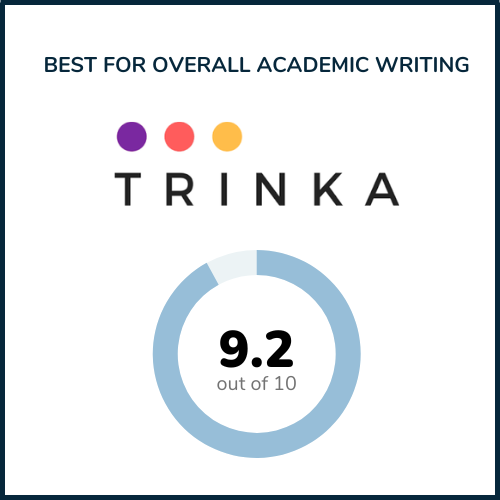
Best Overall for Academic Writing ($6.67/month)
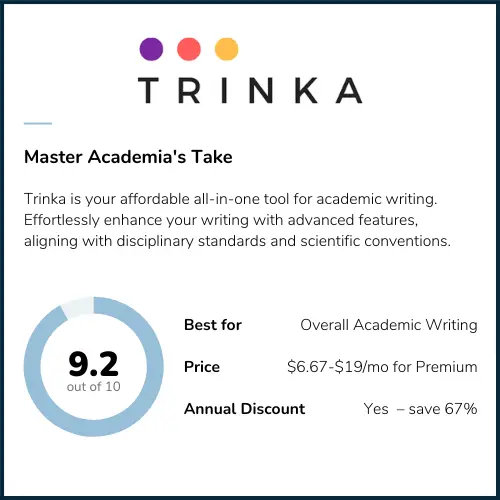
Trinka is a unique AI-powered writing tool designed specifically for academic and technical writing.
What sets Trinka apart is its ability to go beyond basic grammar and spelling corrections. It assists writers in finding the appropriate tone and style for academic writing, while also improving conciseness and implementing formal syntax.
Trinka takes into account the specific research subjects, ensuring that the writing style, word choice, and tone align with disciplinary standards and scientific conventions.
In addition to these advanced writing enhancements, Trinka offers a range of additional features. It includes consistency checking to maintain a coherent writing style, publication readiness checks to prepare your work for submission, plagiarism checking to ensure originality, and a citation analyzer to assess the quality and relevance of your citations.
By providing these comprehensive tools, Trinka offers a convenient and all-encompassing solution for taking your academic writing to the next level.
Key Features:
- Robust grammar and spell-checker – Real-time writing suggestions that also cover tone and style enhancement, syntax, and technical spelling make you a proficient academic writer.
- Disciplinary and scientific conventions – Trinka provides specialized adjustments of language, style, and tone to adhere to scientific conventions in various research fields, based on existing academic publications.
- Powerful plagiarism checker – Through the inclusion of a powerful plagiarism checker powered by iThenticate and Turnitin (renowned software for plagiarism detection), you do not have to worry about accidental plagiarism.
- Wide range of additional features – Trinka offers extra features such as a citation analyzer, journal finder, and publication readiness checker, ensuring your academic writing is prepared for publication efficiently.
- Customization – Trinka has a personal dictionary feature, allowing you to customize the spellchecker to suit your own research work, facilitating a seamless editing process.
- Plug-ins – Plug-ins are available for your favorite browser, and work on Microsoft Word, Google Docs, Gmail, Evernote, Notion, and more.
- For the Trinka Citation Checker and Plagiarism Check, you need to upload your file separately.
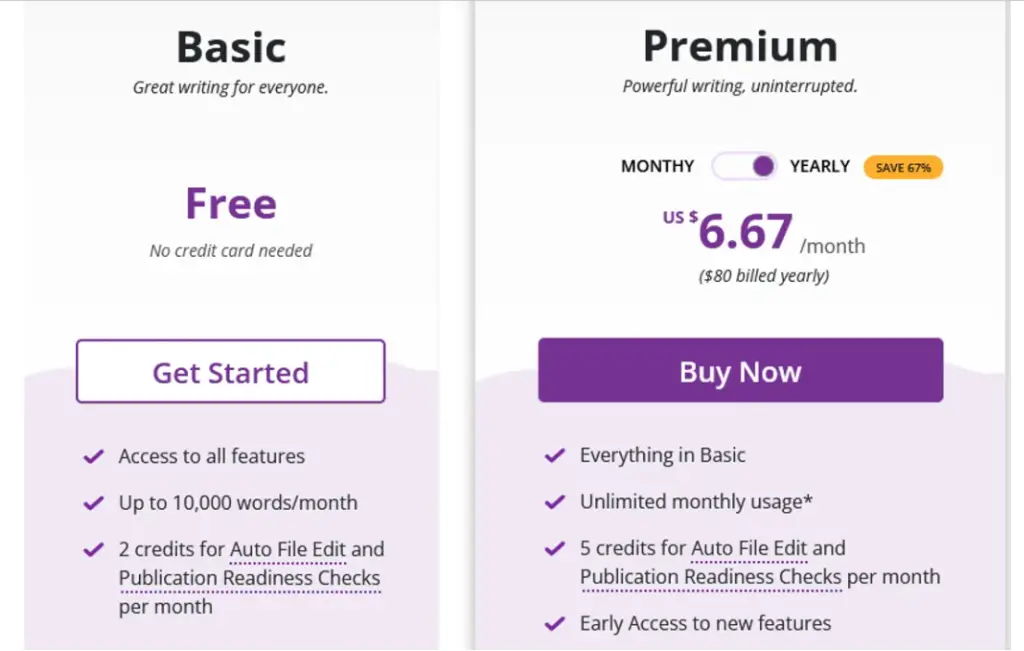
You can use the basic version of Trinka for free, which includes access to all features but with a monthly word limit of 5000 words. The pricing for Trinka’s premium plan starts at $6.67 per month with annual billing, which is extremely affordable.
Best for Summarizing ($15.99/month)
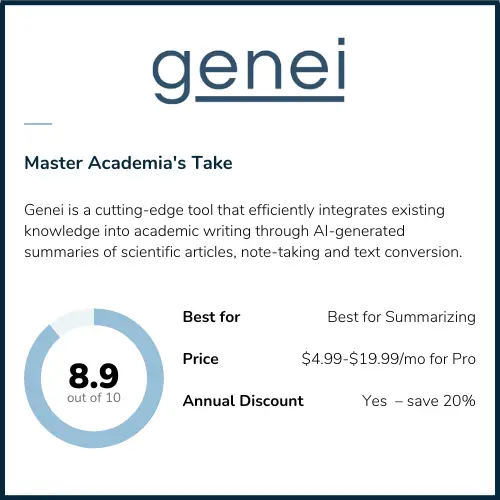
Genei has established itself as a prominent player in the realm of academic AI tools, and rightfully so.
As a comprehensive tool designed for academics, Genei goes beyond assisting with workflow organization and document storage—it also offers a plethora of features tailored specifically for academic writing.
Genei streamlines the academic writing process by utilizing AI-generated summaries and note-taking shortcuts, extracting information from academic articles.
Users can benefit from comprehensive summaries of entire articles or manually highlighted passages, which can be expanded, condensed, rephrased, and summarized with ease using Genei.
Moreover, Genei allows users to seamlessly adapt writing styles and effortlessly incorporate references.
For those heavily reliant on literature reviews in their academic writing, Genei proves to be a gamechanger.
- Research article summaries – Academic writing often necessitates summarizing existing scientific articles, and Genei excels in simplifying this task with its high-quality AI-generated summaries.
- Integrated workflow management – With Genei, you have the ability to save, store, and organize your publications and other documents, providing you with a comprehensive solution to manage your entire workflow within the tool.
- Summarizing notes – When reading and summarizing within Genei, you have the option to utilize the note function, enabling you to highlight specific text passages and gather your thoughts, all of which can be conveniently converted into text format.
- Control and customization over generated summaries: Genei allows you to provide specific instructions to the AI, such as requesting to “expand,” “rephrase,” or “summarize” a particular section.
- Academic discount – As an academic, you can receive a 40% discount on your Genei Pro subscription.
- Genei does not offer the option to customize the style and tone to adhere to specific disciplinary standards.
- To utilize Genei, it is necessary to access its online interface as the tool does not offer any integrations or plug-ins with other platforms.

Genei offers two pricing structures, one for professionals and another for academics.
Professionals:
- The basic version costs £9.99 per month, providing unlimited projects and resources but excluding GPT3 summaries and AI-powered expand, paraphrase & rephrase functions, with a maximum individual file upload of 5GB. The professional pro version, priced at £29.99/month, offers unlimited file upload and full functionality. Annual discounts are available.
- For academics, the basic version costs £4.99, while the pro version costs £19.99, which is essential for accessing the summaries and paraphrasing functions. With the annual discount, the pro version costs £15.99 per month.
3. Quil lBot
Best for Paraphrasing ($8.33/month)
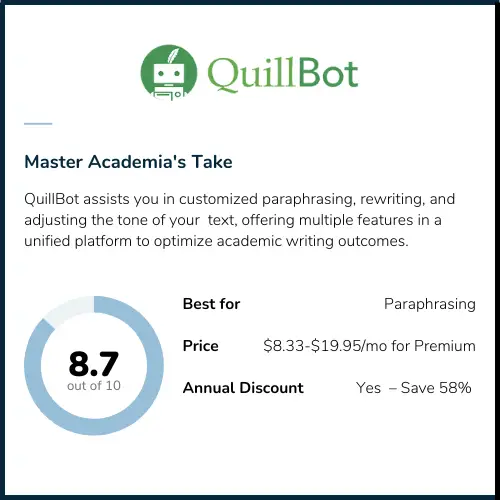
QuillBot is an AI-powered paraphrase tool that helps you to rewrite, edit, and adjust the tone of your text for increased clarity.
With QuillBot ‘s all-in-one Co-Writer, you can access paraphrasing, summarizing, citation creation, and essay writing tools in a single location.
QuillBot’s online paraphraser allows you to modify the meaning of any text using a variety of options. It offers two free modes and five premium modes, allowing you to control the level of vocabulary change.
A synonym slider enables you to adjust the amount of rewriting, in addition to a built-in thesaurus for customizing your paraphrases.
In simple terms, QuillBot’s AI will collaborate with you to generate effective rephrasing. You have a lot of control as you can compare outputs from all seven available modes to choose the most suitable paraphrase.
QuillBot integrates seamlessly with Chrome and Microsoft Word, eliminating the need to switch windows when rephrasing sentences, paragraphs, or articles.
- Paraphrasing options – QuillBot allows you to choose from seven different paraphrasing options (standard, fluency, formal, simple, creative, expand, shorten) to adjust your paraphrasing to your needs.
- Built-in thesaurus – You can customize paraphrases with synonyms using the built-in thesaurus, which is extremely handy.
- Track changes – You can view word count and percent change to feel confident about your revisions when paraphrasing.
- All-in-one – Access all of QuillBot’s tools in one writing space, including paraphrasing, summarizing, access to its citation generator, and its plagiarism checker.
- Translation option – Translate text into 30+ languages.
- Seamless integration – It is easy to incorporate QuillBot into your existing writing tools via Word and Chrome extensions.
- Pause subscription – Academics and students can pause their subscription to align with their academic writing periods.
- QuillBot does not offer the option to customize the style and tone to adhere to specific disciplinary standards.
- QuillBot has no built-in note-taking option.

The free plan of QuillBot allows paraphrasing of up to 125 words and summarizing of up to 1200 words at a time, but excludes advanced features like advanced grammar rewrites, comparing paraphrasing options, and the plagiarism checker.
With the premium plan, you gain access to full functionality, including unlimited word paraphrasing, summarizing up to 6000 words, faster processing, advanced grammar features, tone detection, and more. The premium plan is priced at $19.95 per month or $8.33 per month when paid annually.
QuillBot also offers a 100% money back guarantee for the QuillBot Premium Plan.
Solid Editing and Content Creation Tool ($5.46/month)
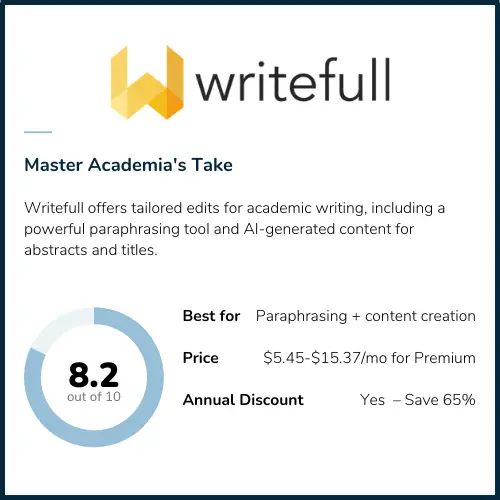
Writefull utilizes language models trained on extensive journal articles to provide tailored edits for academic writing and offers automatic paraphrasing and text generation.
With additional AI widgets like the Abstract Generator, Academizer, Paraphraser, and Title Generator, it provides inspiration and assistance for academic writers.
Writefull is a powerful editing tool designed for individuals who struggle with writer’s block and prefer to revise and edit existing text rather than creating it from scratch.
Writefull is available for Word and Overleaf, allowing users to revise, upload, and download documents with track changes. This can be particularly useful if a document with track changes is required for a journal submission.
- Data security – Writefull provides secure and quick text revisions without storing any user data or search history.
- Track Changes – Users can upload their text for a language check, evaluate overall language quality, and make corrections using Track Changes.
- AI-generated abstracts and titles: Writefull helps you to write abstracts based on your input, and provides suggestions for titles.
- Institutional Premium Accounts – Universities can purchase a license which makes Writefull free to their students and staff.
- GPT detector – Writefull users can utilize a GPT detector feature to determine if a text comes from GPT-3, GPT-4, or ChatGPT models.
- Writefull’s Academizer makes text is supposed to make texts sound more academic, but it does not adjust to different disciplinary standards.
- The seven paraphrasing modes are not all suitable for academic writing.
- While abstracts and titles generated by Writefull ard not be flawless and may require some editing. Nonetheless, they serve as an excellent source of inspiration.

Writefull can be used with limited functionality for free. Its Premium Plan offers unlimited use of all features at a cost of $15.37 per month.
However, there are significant savings if you choose to pay annually, as it amounts to only $5.46 per month.
Tried and Tested Writing Assistant ($12.00/month)
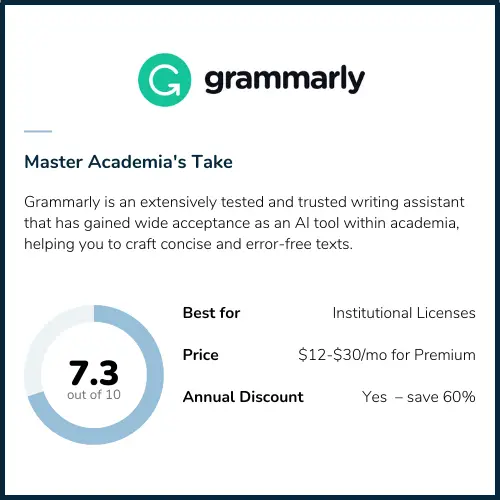
Grammarly is widely recognized as the leading AI-powered writing assistance tool. One of Grammarly’s key advantages is its versatility and convenience.
Grammarly stands out among other AI tools by having a widespread and popular institutional license, which universities readily embrace.
Despite the common reservations university administrators hold against AI usage, Grammarly has established itself as a widely accepted and trusted tool among academics, researchers, and students.
Once installed, it seamlessly integrates into various desktop applications and websites, providing suggestions and assistance as you write across different platforms, including apps, social media, documents, messages, and emails, without requiring separate installations.
Grammarly’s popularity in the academic community can be attributed to its support for citation style formatting and robust plagiarism detection, making it a valuable tool for academic writing.
- Style and tone real-time assistance – Grammarly provides real-time suggestions and guidance on improving the style and tone of your writing.
- Solid free version – The free version of Grammarly is reliable for basic grammar and spelling checks, as well as identifying unclear sentences and auto-citations.
- Additional features: A range of advanced features, plagiarism detection, citation checking, and essay analysis, help you to identify unintentional plagiarism and enhance the overall quality of your writing.
- Special offers for education: Grammarly for Education is available as an institutional license for universities. It ensures high security standards and data protection, which is particularly crucial when dealing with research data. This contributes to Grammarly’s acceptance in academia.
- Grammarly is not directly targeted at academic writing, which means it may not fully cater to the specific needs and conventions of academic writing styles.
- While Grammarly’s premium plan provides suggestions to improve the overall tone of your writing, it lacks subdivision according to research fields or disciplines, which may not meet the specific requirements for unique scientific tone required in academic research writing.

Grammarly’s free plan offers valuable basic writing suggestions to improve your writing.
The premium plan may seem expensive at $30 per month, but with the annual savings of 60%, it becomes much more affordable at $12 per month.
The business account may not be of interest to students or researchers. However, universities can opt for Grammarly for Education, which provides licenses for free premium plans to students and staff.
Efficient Paraphrasing Tool ($9.99/mo)
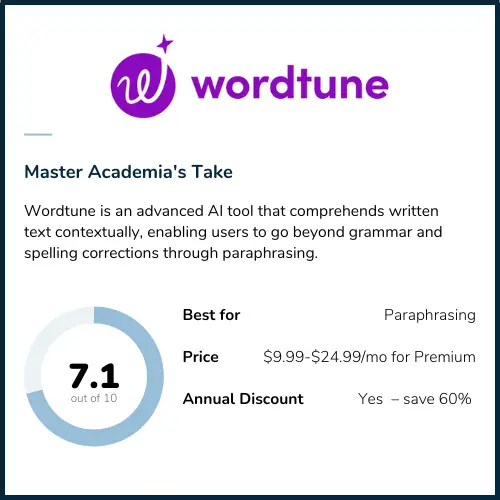
Wordtune utilizes sophisticated AI tools and language models that possess a deep understanding of written text, including its context and semantics.
Wordtune goes beyond mere grammar and spelling corrections, empowering you to express your own ideas effectively in writing.
The tool itself proclaims that it has gained the trust of students and researchers at renowned universities.
Although Wordtune excels in paraphrasing, providing synonym recommendations and an integrated plagiarism check for seamless usage, it is important to note that its focus is not primarily on academic writing, which influences the training of the system.
- Synonyms – Wordtune provides contextual synonym recommendations for your sentences.
- Grammar and spelling correction – With Wordtune you can rest assured that your text is free from grammar and spelling mistakes.
- Plagiarism-free writing – Wordtune helps you avoid plagiarism by rephrasing text while preserving its original meaning with its built-in plagiarism checker.
- Wide range of extensions – Wordtune offers convenient extensions for Chrome, Microsoft Word, iOS, Teams, and more.
- Affordable – Wordtune provides cost-effective AI-powered paraphrasing capabilities.
- Wordtune does not have specific features or styles tailored for academic writing.
- Wordtune primarily focuses on lengthening or shortening text and does not offer extensive tools for academic writing needs.

Wordtune offers a free version with limited features, while the premium version is priced at $24.99 per month. However, users can benefit from a significant 60% discount when opting for an annual subscription: With an annual subscription, the premium version of Wordtune is available at a reduced rate of $9.99 per month.
Academic Language Editor ($8.25 / month)
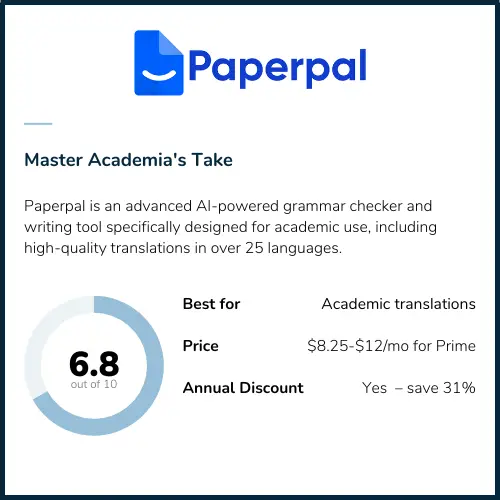
Paperpal, developed by Researcher.life, is a specialized AI tool designed for researchers and academic writers, leveraging the expertise gained from editing numerous manuscripts by professional editors.
With Paperpal , you can effortlessly enhance your writing by addressing grammar errors and improving sentence structure, ensuring your credibility remains intact.
Moreover, Paperpal offers advanced features such as accurate translation and contextual synonyms, along with the choice between Essential and Extensive editing modes, providing flexibility to tailor the editing process to your specific needs.
Available as Paperpal for Word, Web, and Manuscript, this comprehensive tool also checks for structural and technical inconsistencies in your writing.
- Trained with expertise of academic editors – Paperpal is an AI system that has undergone training on academic writing and human-edited manuscripts, guaranteeing high standards.
- Translation – With Paperpal, you can effortlessly translate academic texts from over 25 languages to academic English.
- Compliance with technical language standards – The manuscript checker in Paperpal ensures technical compliance and maintains language quality standards required for journal submissions.
- Consistency feature – Paperpal’s consistency feature checks for and detects stylistic inconsistencies unique to research content, allowing for seamless correction.
- Data security – Your data is secure with Paperpal, as it adheres to a certified data security protocol and is compliant with ISO/IEC 27001:2013 standards.
- Paperpal does not offer a subdivision into research fields or disciplinary standards, meaning it does not cater to specific tones or styles required by different academic disciplines.
- Currently, Paperpal only provides word integration and is limited to integration with Microsoft Word and web browsers.
- Paperpal lacks a built-in plagiarism checker.
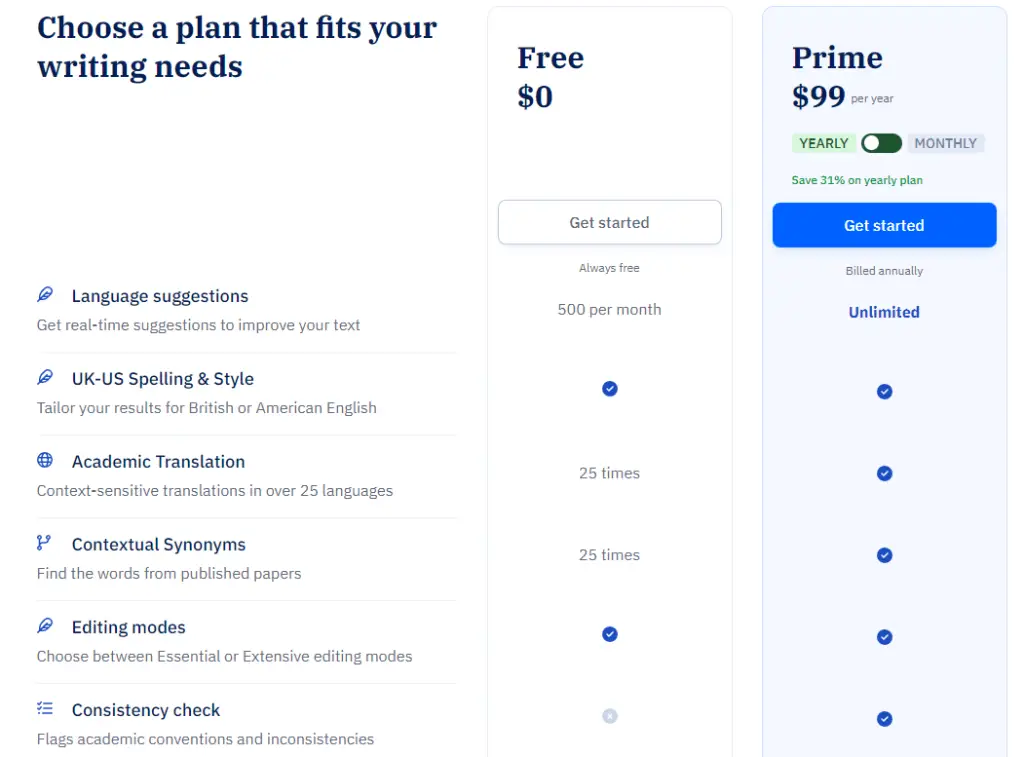
The Prime plan offers unlimited language suggestions and is priced at $99, which translates to just $8.25 per month when billed annually. For those who prefer a monthly plan, it is available at an affordable rate of $12 per month.
Smart Reference Tool While Writing ($3.00/mo)
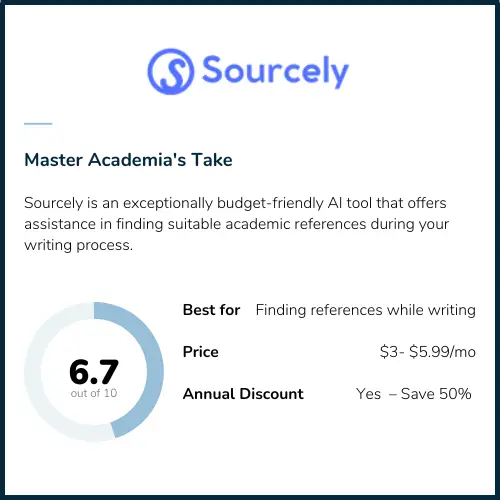
Sourcely is an AI-powered source-finding tool developed by a team of students which offers an easy-to-use solution for academic writers in search of references.
By analyzing text and identifying key themes, Sourcely searches through a vast data set to locate relevant and reliable sources, providing academic writers with the information needed to support their work.
Good references are crucial in academic writing, as they provide legitimacy to arguments and claims.
Simply input your essay title or text, and Sourcely finds suitable sources to enhance your work.
- Source discovery – Sourcely provides a unique approach where you can first write your content and then effortlessly discover relevant sources to support your ideas.
- Summaries – Sourcely offers a convenient feature called “Summarize a Source,” allowing users to obtain a summary of an article or source they are considering for their work.
- Affordability – Sourcely is highly affordable, making it an accessible option for users.
- Sourcely’s feature of providing interesting source recommendations is appealing, but it is not comprehensive enough to solely rely on and neglect consulting resources from other reliable sources.
- Sourcely has limited features compared to other AI writing tools.
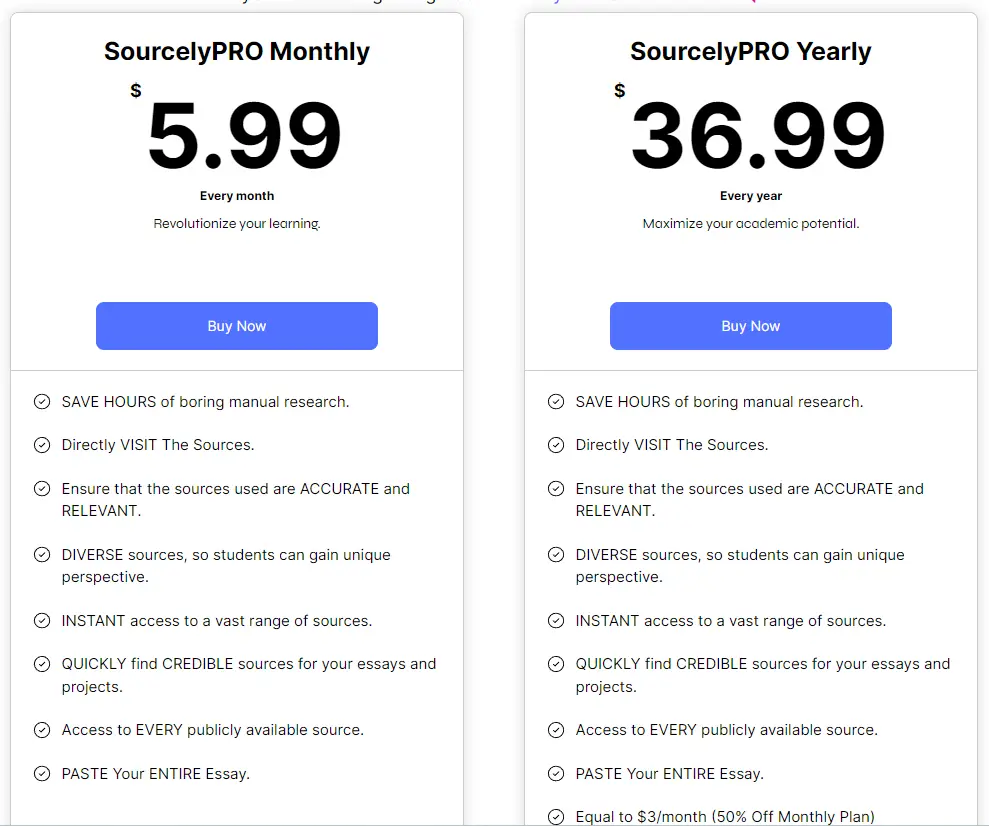
Sourcely offers great affordability with a price of $5.99 per month or $36.99 per year. While it may have fewer features compared to other academic writing tools, its lower price point still makes it a valuable and useful tool for academic writing.
Fast Translating and Rewording Tool ($7.5/mo)
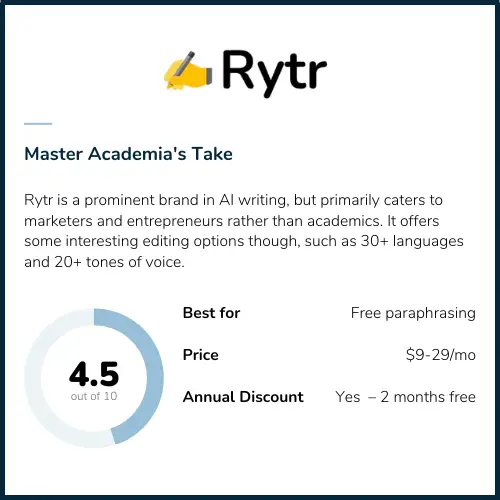
Rytr is an AI writing assistant that quickly generates high-quality content at an affordable price, primarily targeting marketers, copywriters, and entrepreneurs.
While it is recognized by G2 (business software reviews) as a leading brand in the AI Writing space and claims to be “loved by academicians,” it is important to note that Rytr is not trained on academic articles.
Rytr is a text-generating AI tool. Depending on the purpose, academics can find it useful for selecting from multiple languages and tones of voice, as well as rewording and shortening text.
With the convenience of a browser extension, Rytr saves time and ensures your copy is top-notch especially for emails, social media posts, or blogs.
- 40+ use cases – Rytr is an AI writing assistant that offers content generation for over 40 use cases, including emails, cover letters, and blog posts, with the ability to both shorten and lengthen content as needed.
- Generous free plan – While Rytr is not specifically targeting academic writing, it provides a generous free plan that can be beneficial for tasks such as writing emails and blog posts for research dissemination.
- Translation – Rytr can help you to translate your texts into 30+ languages.
- Customization – The platform offers a range of options to enhance the writing process, including language selection, tone customization, expanding or rephrasing text, formatting options, and even a readability score feature.
- Rytr is not suitable for essay or academic writing purposes, as it lacks the necessary features specifically designed for these types of tasks.
- It is not targeted towards researchers and fails to provide valuable tools like citation assistance, which is essential for academic writing.
- While Rytr offers a range of features, some of them, such as SEO optimization, are irrelevant and not beneficial for academic writing purposes.
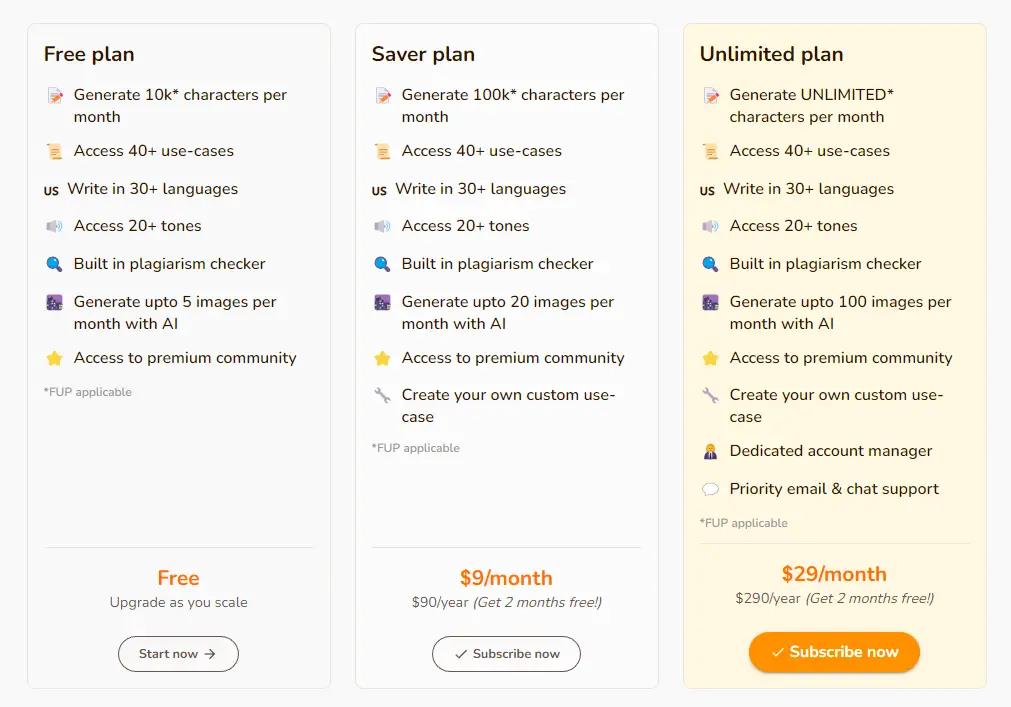
Rytr offers a free plan that allows users to generate content up to 10,000 characters per month. For more advanced features and increased usage, there is the Saver Plan priced at $9 per month (or $7.5 per month when billed annually).
Alternatively, the Unlimited plan is available at $29 per month or $290 per year. These different pricing tiers cater to the diverse needs of users, ensuring they can find the plan that best suits their requirements.
Paraphrasing and Translation Tool ($12.67/mo)
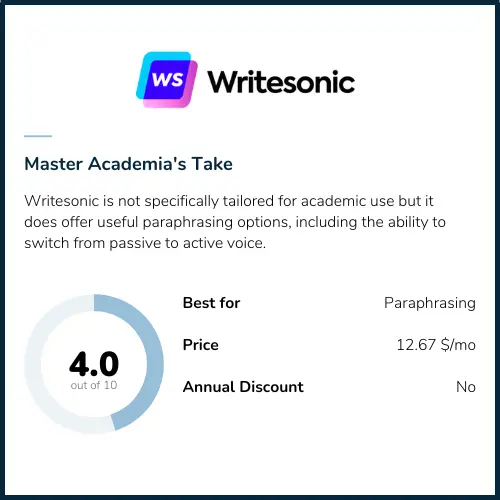
While Writesonic is primarily geared towards marketing teams and entrepreneurs, it offers an intriguing feature for academics: the paraphrasing tool. This tool allows users to rephrase content in multiple languages.
With Writesonic ‘s paraphrasing tool, you can effortlessly rewrite sentences, paragraphs, essays, and even entire articles with a simple click.
Produced content is 100% unique and free from plagiarism.
Upon generating a paragraph, Writesonic provides three different versions for you to choose from. It allows you to select the best option or make edits and revisions using the various variations.
- Choice – Writesonic provides three paraphrased options for each paraphrase, ensuring you find the most suitable and impactful version for your content.
- Switching from passive to active voice – Transform your writing by switching from passive voice to active voice. Active voice sentences provide clarity, conciseness, and impact, ensuring you don’t miss out on great opportunities. The rewording tool allows you to rephrase paragraphs and change the voice of your sentences effortlessly.
- Paraphrase your content in different languages – Writesonic’s Paraphrase tool can be used to conduct AI paragraph rephrasing in up to 26 different languages.
- Writesonic is not specifically designed for academic writing, and its features are not tailored to meet the specific requirements of academic writing.
- The platform lacks an academic writing style, which is essential for maintaining scholarly integrity and adhering to academic conventions.
- While Writesonic offers various features, some of them, such as SEO optimization, are not directly applicable or relevant to academic writing tasks.
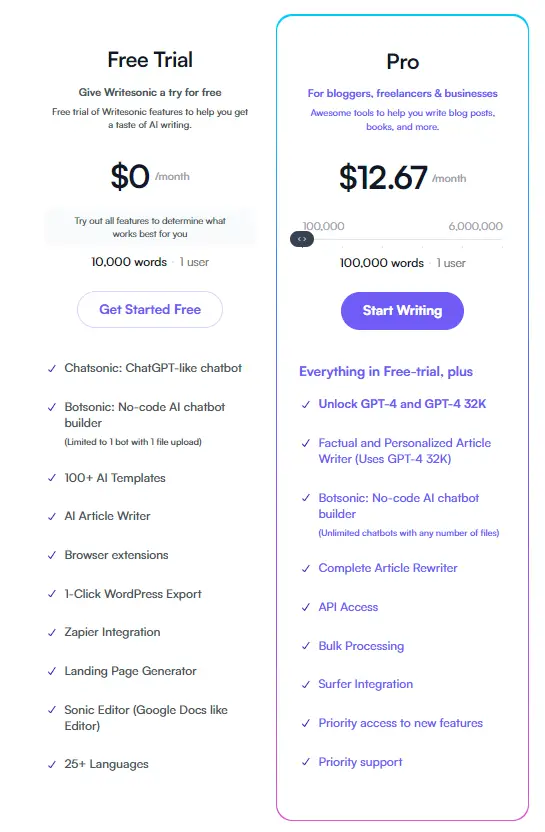
You can start with a free trial of Writesonic to experience its features. If you decide to upgrade to the Pro version, it is available at a cost of $12.67 per month.
Summarizing and Paraphrasing Tool ($19.99/mo)
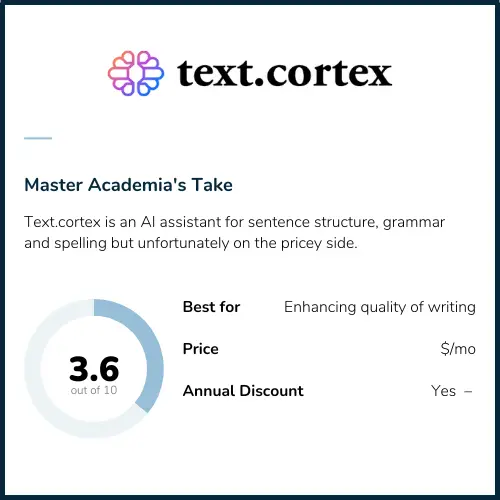
With TextCortex you can say goodbye to any worries about wording and spelling mistakes. Furthermore, it can help you to speed up your reading process.
TextCortex is an AI tool which can condense long texts into concise summaries, capturing the essential points.
Moreover, it can enhance your fluency and adapting vocabulary, tone, and style to match any situation.
- Paraphrasing – TextCortex offers a powerful paraphrasing tool to help you rephrase and enhance your text.
- Translations – TextCortex’s translation feature allows you to effortlessly write in over 25 languages including French, German, Spanish, Swedish, and more.
- TextCortex is not specifically designed for academic writing, catering to a broader audience instead.
- It may not be cost-effective for academics due to its high price relative to the limited functionality it offers for academic writing purposes.

With the free version of TextCortex, you have the ability to create up to 10 pieces per day. For enhanced features and unlimited usage, the Pro version is available at a price of $19.99.
The landscape of AI writing tools is continuously evolving, witnessing the introduction of new tools regularly. However, not all these tools are equally suitable for academic writing, as their effectiveness depends on your specific goals and requirements.
While some tools, although not specifically designed for academic writing, can still provide valuable assistance in certain areas, there are standout options that are solely dedicated to enhancing academic writing.
Keeping this in mind, our top picks for academic writing support are the following AI tools:
Master Academia
Get new content delivered directly to your inbox.
Subscribe and receive Master Academia's quarterly newsletter.
How to benefit from ChatGPT as an academic
38 common academic job interview questions (+ powerful answers), related articles.

How to address data privacy and confidentiality concerns of AI in research
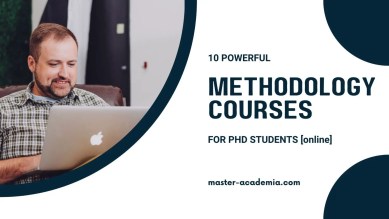
10 powerful methodology courses for PhD students [online]

25 short graduation quotes: Inspiration in four words or less
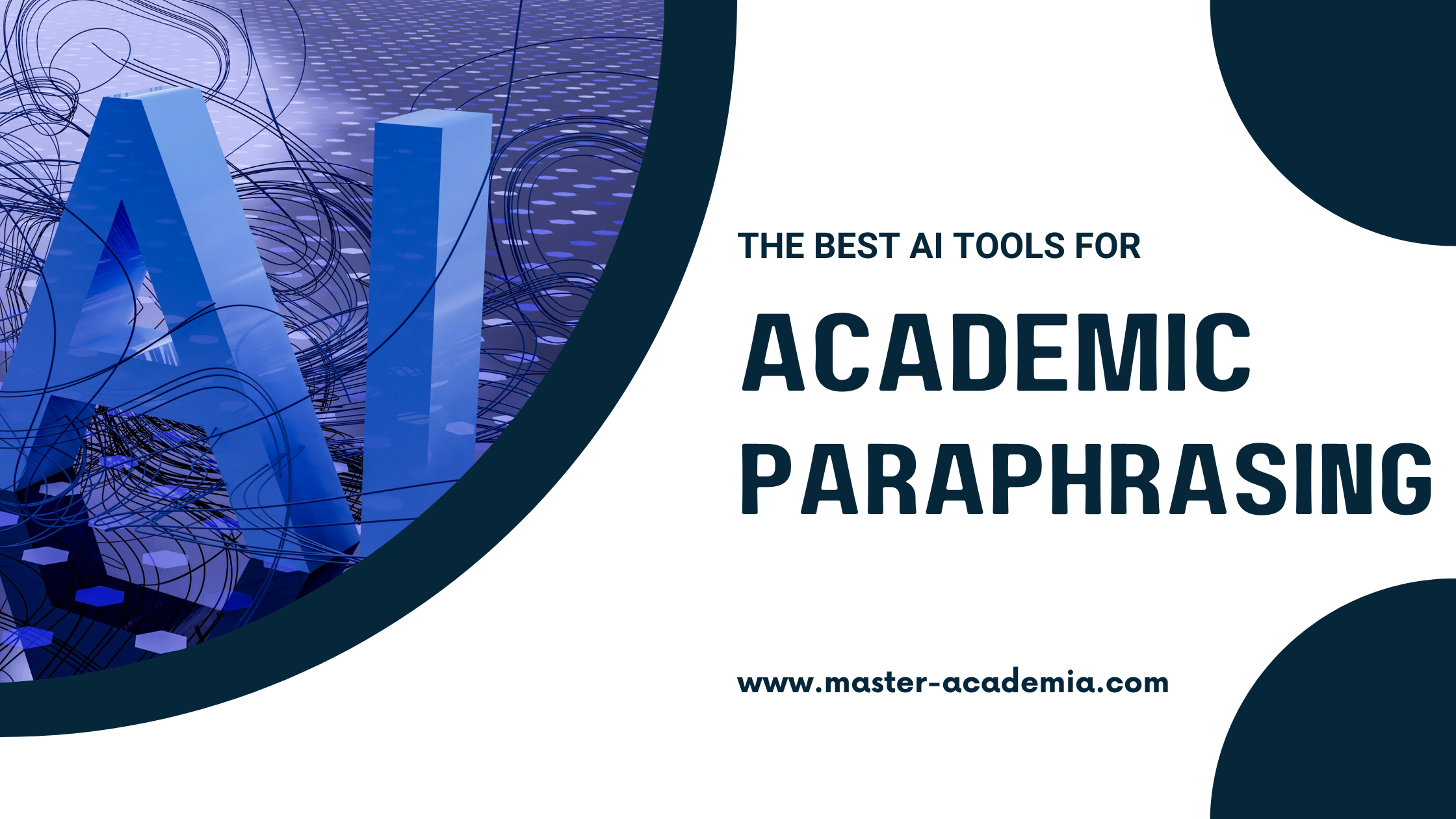
The best AI tools for academic paraphrasing: tested and ranked

How to Write an Impressive Thesis Using an AI Language Assistant

Session Agenda
Writing an effective thesis is important for researchers to demonstrate their thorough knowledge about the research subject. However, this could be a daunting task given the struggle to compile years of research in a structured and error-free manner. The process becomes even more stressful when the scuffle for using verbs in their correct tense, adding appropriate punctuation marks, and fixing grammatical and contextual spelling errors ensues. This webinar aims to help researchers understand how Trinka , an advanced artificial intelligence-powered writing assistant, can assess and enhance the quality of their thesis. It will further discuss how this dedicated AI-based tool can assist researchers to resolve the longstanding challenge of communicating their thesis in a grammatically correct and scientifically structured manner.
- Three stages of Writing: Planning, Writing, and Editing
- Structure of a Thesis – Types and Important Sections
- How to Organize your Thoughts and Begin Writing
- How to Write a Thesis Statement
- Common Errors in Thesis Writing
- Expert Tips on Drafting Each Section of a Thesis
- Role of AI in Academic Writing
- How AI Can Assist Authors to Write an Impressive Thesis
Who should attend this session?
- Graduate students
- Early-stage researchers
- Doctoral students
About the Speaker
Douglas W. Darnowski, Ph.D.
Dr. Darnowski is a highly published researcher with experience in publishing books, book chapters, research papers, review articles, teaching material (textbooks, instruction manuals, etc.) and book reviews. Dr. Darnowski has over 20 years of experience in editing of scientific papers for peer-reviewed journals. Furthermore, he has reviewed over 50 introductory biology textbook chapters and wrote over 9,000 questions for Sinauer, W.H. Freeman, McGraw Hill, and Pearson. Currently, he is associated with the Editorial Boards of Carnivorous Plant Newsletter and International Triggerplant Society. He is also the recipient of more than 40 research grants/fellowships.
Related Events

Launching ‘Review Assistant’: An AI-powered Tool for Peer Reviewers
- Boosting the reviewing process
- Search strategies for locating articles
- Introducing ‘Review Assistant’
- Reporting high-quality reviews
Demystifying Research Methodology With Field Experts
- Choosing research methodology
- Research design and methodology
- Evidence-based research approach
- How RAxter can assist researchers
Register Now
Register now for free, want to conduct custom webinars and workshops , be our next speaker.
Sign-up to read more
Subscribe for free to get unrestricted access to all our resources on research writing and academic publishing including:
- 2000+ blog articles
- 50+ Webinars
- 10+ Expert podcasts
- 50+ Infographics
- 10+ Checklists
- Research Guides
We hate spam too. We promise to protect your privacy and never spam you.
I am looking for Editing/ Proofreading services for my manuscript Tentative date of next journal submission:

As a researcher, what do you consider most when choosing an image manipulation detector?

Credit: Image Created with AI
November 21, 2023
Share this page
How AI can help you write your research paper
Putting together a research paper can be a daunting task, often involving hours of research, managing information, and crafting a well-structured document. However, the advent of AI-powered tools makes the process more manageable than ever before. Even better than some research tips, explore how AI-powered tools can change the way you build research papers, making the entire process smoother, more precise, and less time-consuming.
Use AI for research
One of the most laborious aspects of writing a research paper is gathering information and conducting thorough research; AI-powered tools can help streamline this process significantly.
Use Copilot in Edge to find relevant research papers, articles, and academic sources with ease. By simply inputting your paper parameters, research topic, or keywords, you can quickly access a vast database of academic resources, saving you hours of scouring the internet. Copilot can also swiftly provide definitions, explanations, and relevant context for unfamiliar terms or passages on the page, eliminating the need to switch between tabs or search engines. Moreover, Copilot can summarize extensive web content and suggest related articles or papers to deepen your understanding. By integrating Copilot into your research workflow, you can enhance productivity and ensure access to up-to-date and pertinent information.

Organize your paper with AI
Once you've collected the necessary information, you need to organize and structure your research paper effectively. Copilot, accessible right in the sidebar, can help build a clear, well-structured outline for your paper based specifically on your topic and web sources. By inputting key points and subtopics, Copilot can generate a structured outline to serve as a roadmap for your argument. This ensures your research paper is logically organized, making it easier for readers to comprehend.
Come across a concept or fact on the web that you want to use? Something spark an idea you want to get down and revisit? Use the Compose in the Microsoft Edge sidebar to write up a summary of the idea, or where it fits into your larger argument. Ask for a citation while you’re at it—more on that a little later.
As a bonus, Microsoft Edge’s AI-powered tools check for grammar and spelling errors and provide suggestions to improve the clarity of your writing. If you like writing chunks of your paper as you research, this is ideal. They can help refine your writing style and ensure your ideas are effectively communicated.
Finding sources using AI
Looking for primary or academic sources? Ask Copilot in Edge. With a topic, keywords, and questions, the AI-powered tool can help hunt down possible sources fast. Copilot can provide links and even summaries of the sources. To be sure the sources are credible, always review them for yourself, of course, and make the best decision about what is relevant and persuasive for your paper.
Citing sources using AI
Citing sources and managing references is a crucial aspect of research paper writing—and one of the most dreaded. Fortunately, AI-powered citation and reference management tools can simplify the tedious citation process. As you track sources and collect information across the web, the AI-powered Microsoft Edge sidebar can help generate citations for your sources. Simply ask for Copilot to cite a source using a specific style—typically APA, MLA, or Chicago—and it will find the best citation generator for your paper. The sidebar tools can also serve as a sort of extra set of eyes, checking your footnotes and bibliography for errors or inconsistencies.
Ethical use of AI-powered tools in school
The ethics of using AI for research papers raise important questions about transparency, integrity, and the role of human creativity and critical thinking in academia. While AI-powered tools undeniably offer efficiency and assistance in the research process, it's crucial for researchers to maintain transparency. Proper citation and acknowledgment of AI-generated content or assistance is essential to uphold academic integrity and avoid plagiarism.
Ultimately, the responsible use of AI in research should complement human ingenuity rather than replace it, emphasizing collaboration between technology and researchers to advance knowledge ethically and morally.
Embark on you next research paper with AI’s help
AI-powered tools like those built into Microsoft Edge have the ability to revolutionize the process of developing research papers. From automating research to helping with organization, citation management, even language translation, these tools offer a variety of benefits to researchers.
When you embark on your next research paper, consider integrating AI-powered tools into your workflow to save time, enhance accuracy, and improve the overall quality of your work. Copilot in Edge is an easy and convenient AI portal for researchers and writers. Try Microsoft Edge today to tap into the power of AI and improve your research papers today.
Products featured in this article
Microsoft Edge

More articles

How to keep your flow and focus with Microsoft Edge
Increase productivity and focus on the task at hand with built-in Microsoft Edge features.

How to stay organized with Microsoft Edge
Learn about built-in features to keep your browser organized and efficient.

Why Microsoft Edge is the best browser for students
Microsoft Edge is the best browser for students thanks to its helpful features and add-ons.
The Ultimate Thesis Statement Generator
Thesis Statement Generator
Are you struggling with formulating a concise, compelling thesis statement? You're not alone. Jenni.ai is here to empower your academic writing journey with our thesis statement generator, a sophisticated AI tool dedicated to generating and refining thesis statements. Unlike other tools, Jenni ensures the authenticity and uniqueness of your thesis statement, setting a strong foundation for your academic piece.

Loved by over 1 million academics

Trusted by Academics from Leading Universities
Discover how students from renowned universities enhance their academic writing with Jenni AI

Discover the Edge of Academic Excellence with Jenni AI
Envision a clearer path towards crafting thesis statements with these winning features
Personalized Thesis Statement Suggestions
Jenni AI tailors suggestions based on your input, helping you craft a thesis statement that aligns with your research goals and academic standards.
Get started

Interactive Writing Assistant
Engage with Jenni to refine and improve your thesis statement. It's like having a collaborative partner in the writing process, ensuring your thesis is on the right track.
Accessible Anytime, Anywhere
With Jenni AI, receive thesis statement assistance whenever inspiration strikes, on any device.

User-friendly Interface
With an intuitive interface, Jenni AI is easy to navigate and use, making the process of crafting a thesis statement straightforward and enjoyable.
Your Integrity, Our Priority
Jenni AI isn’t here to do the work for you but to assist you in overcoming the hurdles of thesis statement writing. We take academic integrity seriously. We are here to support you, not to shortcut your academic journey.
How does the Thesis Statement Generator Work?
Jenni AI seamlessly integrates into your research workflow
Sign Up for Free
Create your free Jenni.ai account to unlock a world of academic excellence. Your journey toward a compelling thesis statement begins here.
Input Your Topic
Type in your research topic or a key question you aim to answer through your thesis. Jenni’s intuitive interface makes this step a breeze.
Receive Suggestions
Based on your input, Jenni.ai provides you with a set of preliminary thesis statement suggestions. These are tailored to reflect the essence of your research while adhering to academic standards.
Refine with Real-Time Feedback
Jenni.ai offers real-time feedback as you tweak and refine your thesis statement. This iterative process ensures clarity, coherence, and a strong alignment with your research objectives.
Export Your Thesis Statement
Once satisfied, simply download or copy your thesis statement, and you’re ready to delve deeper into your academic writing journey.
Real Testimonials from Real Achievers
Discover the stories of academics who have experienced the transformative impact of Jenni AI on their academic journeys.

· Aug 26
I thought AI writing was useless. Then I found Jenni AI, the AI-powered assistant for academic writing. It turned out to be much more advanced than I ever could have imagined. Jenni AI = ChatGPT x 10.

Charlie Cuddy
@sonofgorkhali
· 23 Aug
Love this use of AI to assist with, not replace, writing! Keep crushing it @Davidjpark96 💪

Waqar Younas, PhD
@waqaryofficial
· 6 Apr
4/9 Jenni AI's Outline Builder is a game-changer for organizing your thoughts and structuring your content. Create detailed outlines effortlessly, ensuring your writing is clear and coherent. #OutlineBuilder #WritingTools #JenniAI

I started with Jenni-who & Jenni-what. But now I can't write without Jenni. I love Jenni AI and am amazed to see how far Jenni has come. Kudos to http://Jenni.AI team.

· 28 Jul
Jenni is perfect for writing research docs, SOPs, study projects presentations 👌🏽

Stéphane Prud'homme
http://jenni.ai is awesome and super useful! thanks to @Davidjpark96 and @whoisjenniai fyi @Phd_jeu @DoctoralStories @WriteThatPhD
Frequently asked questions
How do i start using jenni ai, is jenni ai free to use, can i use jenni ai on my mobile device.
How does Jenni AI ensure the quality of the thesis statement?
Will Jenni AI write my entire thesis?
What do I do if I need further assistance?
Can I use Jenni AI on my mobile device?using Jenni AI's outline generator guarantee a better grade?
Jenni AI vs Competitors: A Comparative Insight
Experience a notable difference in how you articulate and present your scholarly ideas with Jenni AI
Feature Featire
COMPETITORS
Quality of Suggestions
Advanced AI algorithms ensure high-quality, academically sound thesis statement suggestions tailored to your research topic.
Generic suggestions that may lack depth or alignment with your specific research objectives.
User-Friendly Interface
User-friendly interface designed for seamless navigation and immediate engagement, requiring no technical expertise.
May have a steeper learning curve, with complex features that require time to understand.
Comprehensive Customization
Jenni's outline generator allows for comprehensive customization, empowering you to tailor your outline to your specific needs and preferences.
While competitors may offer customization options, they may not provide the same level of flexibility and adaptability.
Real-Time Feedback
Provides instant feedback as you refine your thesis statement, aiding in the iterative improvement process.
May lack real-time feedback, leaving you without guidance for improvement.
Competitive pricing with a free version available to get you started.
May have higher pricing or lack a free version for trial.
Ready to Elevate Your Thesis Writing?
Sign up for a free account now and experience the power of Jenni AI in crafting compelling thesis statements!
How to Craft Effective Thesis Statements With AI Writing Tools?

- May 24, 2024 Updated
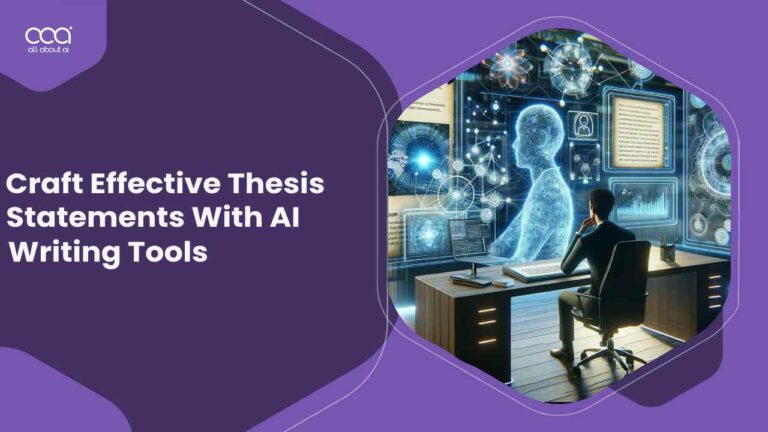
As an academic writer, I’ve found that the thesis statement is a critical element of any paper. It sets the tone and direction for my writing. Recently, I’ve been incorporating best AI writing tools to write thesis into my process, and they’ve significantly transformed how I approach thesis statements.
In this article, I’ll share my experience with some of the best AI writing tools , highlighting how to craft effective thesis statements with AI writing tools. Let’s get into it.
How to Craft Effective Thesis Statements With AI Writing Tools: Step-by-Step Guide
Here, I’ll share my step-by-step approach and teach you how to craft effective thesis statements with AI writing tools. This method has consistently improved both the efficiency and effectiveness of my academic writing.
Step 1: Identifying the Topic
The first step in thesis writing is identifying a relevant and engaging topic. AI tools such as OpenAI’s GPT-4 are invaluable in this stage, offering up-to-date suggestions on trending and significant topics.
These tools analyze current research and discussions in various fields, providing me with a broad range of potential topics that are both contemporary and academically relevant.
Step 2: Narrowing the Focus
Once a topic is chosen, the next challenge is to narrow it down to a specific aspect that is both manageable and significant.
AI tools integrated with databases like Google Scholar or JSTOR aid in this process by analyzing large volumes of data and research papers.
This helps in focusing on a particular aspect or angle of the chosen topic, ensuring that the thesis is both specific and substantive.
Step 3: Formulating the Argument
Formulating a clear and debatable thesis statement is a critical step. AI-powered tools like Grammarly and Hemingway Editor are useful here.
They offer linguistic analysis, suggesting ways to construct a strong argument that is both clear and persuasive.
These right AI writing tools analyze sentence structure, word choice, and overall readability, ensuring that the thesis statement is cogent and impactful.
Step 4: Refining the Thesis Statement
Refinement is key to crafting an effective thesis statement. AI tools such as ProWritingAid provide suggestions on improving the clarity and conciseness of the statement.
They help in fine-tuning the language, ensuring that the thesis statement is well-phrased, impactful, and devoid of any ambiguity or redundancy.
Step 5: Seeking Feedback
Gathering feedback on the thesis statement is crucial. Platforms like Scribbr use AI algorithms to provide constructive feedback on the strength, coherence, and clarity of the thesis statement.
They offer insights into how the statement can be improved, making it more robust and compelling.
Step 6: Final Review
Finally, ensuring the originality of the thesis statement is paramount. Tools like Turnitin are essential in this final stage.
They check for originality and uniqueness, ensuring that the thesis statement is free from unintentional plagiarism and stands out in the academic discourse.
What Are the Essentials of a Thesis Statement?
In my writing, I ensure that my thesis statement is clear, concise, and well-defined, demonstrating how to craft effective thesis statements with AI writing tools . It’s the guiding light for the reader, steering them through my argument or analysis.

The key elements I focus on in a strong thesis statement include:
Clarity and Conciseness
A thesis statement is the backbone of any well-written academic paper, providing a clear and concise summary of the argument or analysis that follows. It’s essential that this statement is devoid of complex jargon and unnecessarily long sentences.
Clarity ensures immediate comprehension by the reader, while conciseness prevents dilution of the core argument, keeping the reader’s attention focused.
Specificity and Focus
The effectiveness of a thesis statement largely depends on its ability to narrow down a broad topic into a specific, focused argument.
This specificity allows for a detailed and in-depth exploration of the subject matter, preventing the paper from veering off into too general or unrelated discussions.
A focused thesis guides the direction of research and writing, ensuring that every element of the paper contributes towards exploring this central argument.
Arguable and Defensible
An impactful thesis statement is one that presents a clear argument or perspective, which is not only open to discussion but can also be supported with concrete evidence.
This argumentative nature invites critical thinking and engagement from the reader, prompting them to consider the topic from the writer’s perspective and anticipate the evidence that will be presented in support of this argument.

Originality and Insight
In academic writing, a thesis statement should not merely state a fact or a universally accepted truth. Instead, it should offer an original perspective or a novel approach to the topic.
This originality is what contributes to the broader academic dialogue, providing new insights or challenging existing ones.
The thesis should make a unique contribution to the topic, showcasing the writer’s deep understanding and personal interpretation of the subject. The best AI writing tools for academic writing can help ensure originality in your thesis statement.
Alignment with the Paper
A thesis statement must be in harmony with the rest of the paper. Every paragraph, argument, and piece of evidence presented in the paper should directly support and reinforce the thesis statement.
This alignment ensures a cohesive and coherent structure, where all elements of the paper work synergistically to argue or analyze the central claim.
How AI Writing Tools Assist in Refining and Rewriting Thesis Statements
In my experience, artificial intelligence tools are excellent at offering alternative phrasings, checking consistency with the overall content, and improving clarity, embodying how to craft effective thesis statements with AI writing tools.
They suggest various ways to express the thesis and ensure it aligns with the rest of my content.
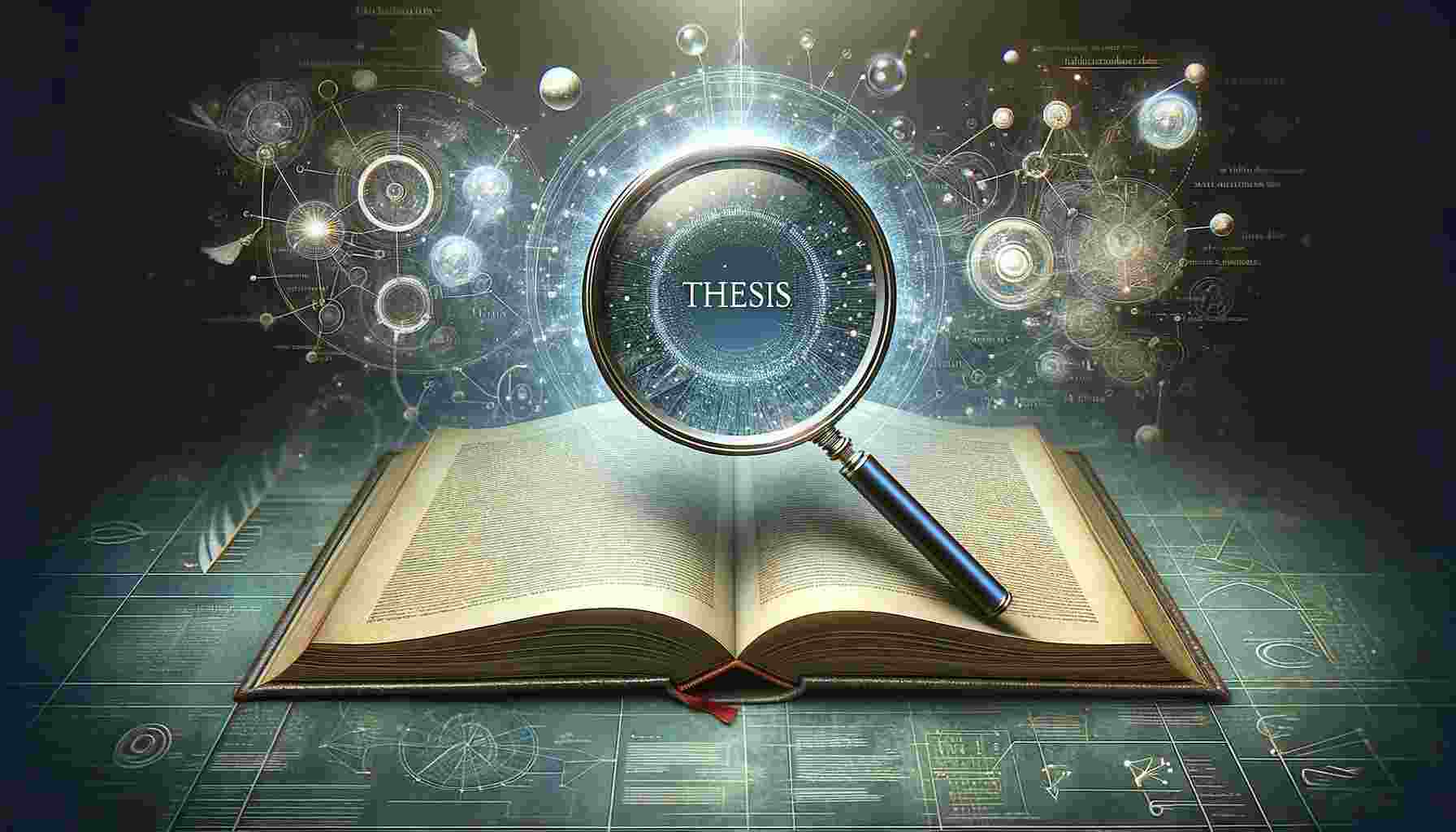
Suggesting Variations
One of the primary ways AI tools assist in thesis writing is by suggesting multiple variations of a thesis statement.
These suggestions provide different ways of expressing the same idea, helping to find the most effective and impactful phrasing.
Checking Consistency
AI tools are highly efficient in ensuring that the thesis statement aligns with the overall content and tone of the paper.
They analyze the entire document to ensure that every part of the paper supports and reinforces the thesis, maintaining a cohesive argument throughout.
Improving Clarity
AI suggestions are instrumental in enhancing the clarity of the thesis statement. They help rephrase complex or ambiguous statements into clearer, more understandable language. This improvement in clarity is crucial for engaging and retaining the reader’s interest.
Enhancing Persuasiveness
AI tools are adept at suggesting more persuasive language and stronger arguments, thereby making the thesis more compelling.
They analyze the persuasive elements of language, such as word choice and sentence structure, to enhance the argumentative power of the thesis statement.
Detecting Redundancies
AI tools efficiently identify and eliminate redundant phrases or arguments within the thesis statement. This streamlining ensures that the statement is concise and focused, enhancing its overall impact.
Offering Customized Suggestions
Based on the style, tone, and topic of the paper, AI tools provide tailored advice to make the thesis more effective.
These customized suggestions are particularly helpful in ensuring that the thesis statement is well-suited to the specific requirements and expectations of the paper’s intended audience.
Incorporating AI Tools: A Comparative Insight
Comparing AI tools with traditional methods, I find that AI significantly enhances efficiency in idea generation, multilingual content creation , and real-time suggestions, making the process of crafting a thesis statement less time-consuming and more effective.

Speed of Research
One of the most significant advantages of using AI tools in thesis writing is the speed at which research can be conducted.
AI tools provide quick and easy access to a vast array of datasets and research materials, a process that would take significantly longer using traditional research methods.
Idea Generation
Compared to traditional brainstorming methods, AI tools offer immediate, diverse, and often more creative ideas for thesis statements.
These tools can analyze existing literature and trends to suggest unique angles and perspectives that might not be immediately apparent through conventional brainstorming.
Language and Style
In terms of language and style, AI tools offer a level of refinement and sophistication that surpasses traditional manual proofreading and editing.
They analyze the thesis statement for language use, style, tone, and readability, ensuring that it meets high standards of academic writing.
Consistency Checking
AI tools are more efficient and accurate in checking for consistency in the thesis statement and throughout the paper.
They ensure that every part of the paper aligns with and supports the central thesis, which can be more challenging to achieve with manual reviews.
Accessibility of Resources
When it comes to accessing research materials and references, AI tools provide a broader and more comprehensive range of resources than traditional library-based research.
They offer access to the latest studies, articles, and data from various disciplines, making the research process more efficient and thorough.
Plagiarism Detection
AI-powered plagiarism checkers offer a level of thoroughness and accuracy in detecting plagiarism that is difficult to achieve through manual methods.
They scan a wide range of sources, including academic papers and online content, ensuring that the thesis statement is original and free from unintentional plagiarism.
How Do Different Paper Types Influence Thesis Formation?
The nature of the thesis statement depends on whether the paper is analytical, expository, or argumentative. Understanding how to craft effective thesis statements with AI writing tools can greatly assist in tailoring your thesis to fit these specific types of papers effectively.

I use AI tools tailored to understand these differences, which offer appropriate suggestions based on the paper type.
Analytical Papers
In analytical papers, the thesis statement should dissect an idea or issue into its essential components, providing a clear and focused analysis of each part.
The thesis must guide the structure of the analysis, determining the key aspects or elements that will be examined in detail.
Expository Papers
For expository papers, the thesis should aim to explain or elucidate a particular concept or idea.
It should be informative and educational, providing clarity and insight into the subject.
A thesis in expository papers often outlines the aspects that will be explored to offer a comprehensive understanding of the topic.
Argumentative Papers
In argumentative papers, the thesis statement must take a clear and definitive stand on a particular issue or debate. It should present a strong, persuasive argument that is supported by evidence throughout the paper.
In argumentative papers, the thesis statement is often controversial or provocative, aiming to convince the reader of a particular viewpoint.
Comparative Papers
The thesis statement in comparative papers should focus on highlighting the similarities and differences between two or more subjects, ideas, or phenomena.
It requires a balanced and nuanced approach, analyzing each subject in relation to the others, and drawing insightful comparisons and contrasts.
Narrative Papers
Though less common in academic writing, narrative essays still require a thesis statement. In these papers, the thesis sets the tone for a story or personal experience, focusing on a central theme, message, or lesson.
The thesis statement in narrative essays often reflects the writer’s personal insights or learnings from the experience being shared.
Can AI write my thesis?
Can i use chatgpt for my thesis, can universities detect ai writing, which ai is best for writing a thesis, conclusion: embracing ai for effective thesis writing.
AI writing tools have revolutionized my approach to thesis writing. They serve as powerful aids, but the core of thesis writing still relies on individual critical thinking and expertise.
Now that you know how to craft effective thesis statements with AI writing tools, why not check out integrating AI writing tools into academic research to discover how you can further leverage these tools in your research endeavors?
Check out the articles in the how-to guide to learn more and you can enhance your understanding of our AI terms by visiting our AI glossary as well.

Digital marketing enthusiast by day, nature wanderer by dusk. Dave Andre blends two decades of AI and SaaS expertise into impactful strategies for SMEs. His weekends? Lost in books on tech trends and rejuvenating on scenic trails.

How to Use AI Tools for Predictive Maintenance in Manufacturing?

How to Turn Off Google AI Overview?

How to Use AI Tools to Automate Legal Document?

How to Turn Off Meta AI on Facebook, Instagram, and WhatsApp?
Leave a reply cancel reply.
Your email address will not be published. Required fields are marked *
Save my name, email, and website in this browser for the next time I comment.
How to Write a Better Thesis Statement Using AI (2023 Updated)
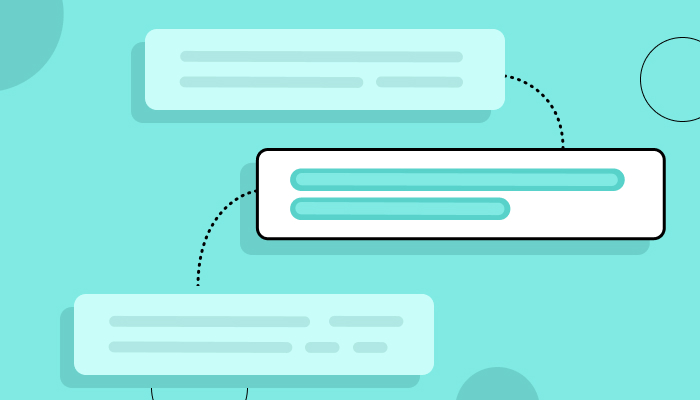
Table of contents

Meredith Sell
With the exceptions of poetry and fiction, every piece of writing needs a thesis statement.
- Opinion pieces for the local newspaper? Yes.
- An essay for a college class? You betcha.
- A book about China’s Ming Dynasty? Absolutely.
All of these pieces of writing need a thesis statement that sums up what they’re about and tells the reader what to expect, whether you’re making an argument, describing something in detail, or exploring ideas.
But how do you write a thesis statement? How do you even come up with one?
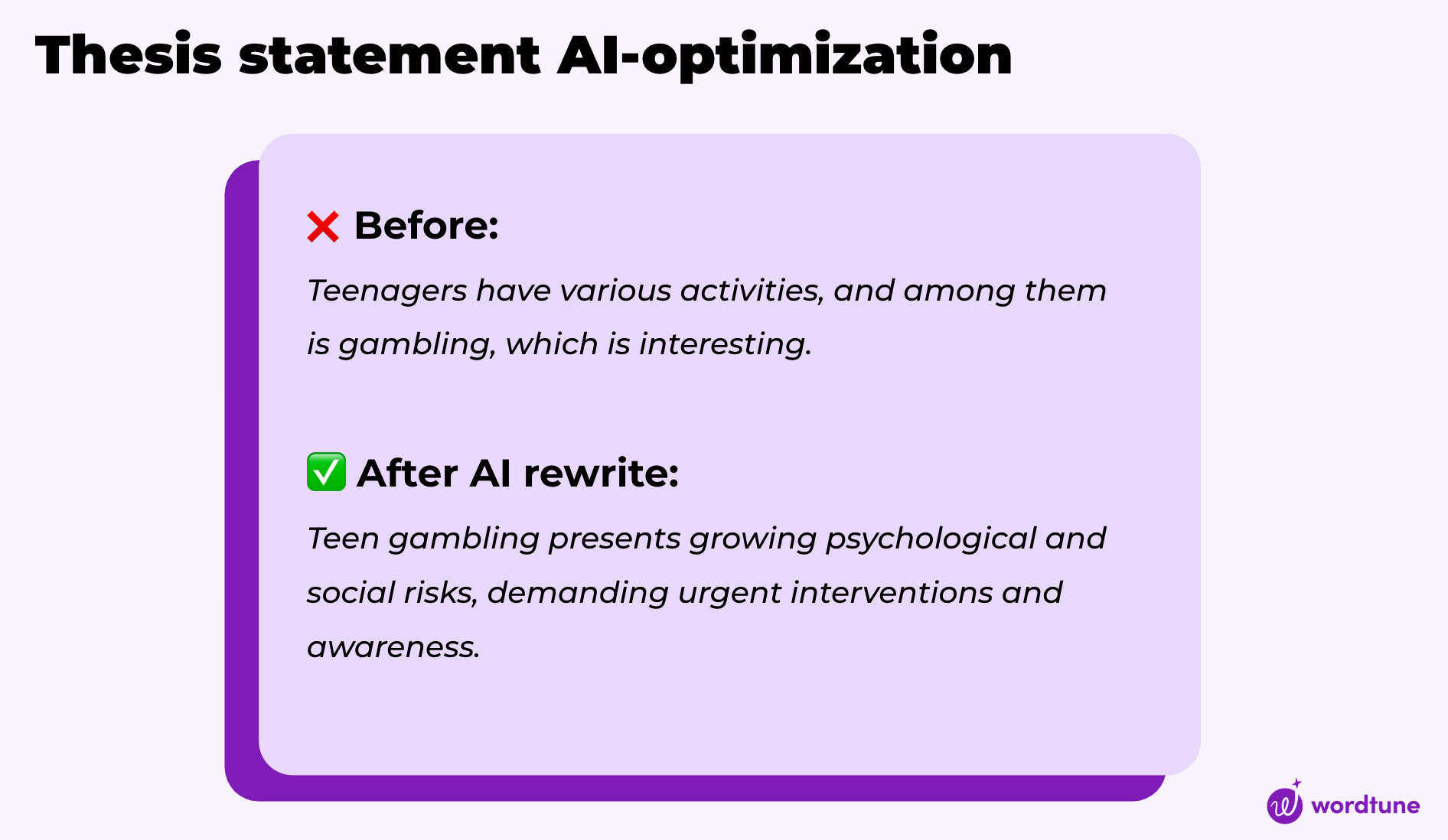
This step-by-step guide will show you exactly how — and help you make sure every thesis statement you write has all the parts needed to be clear, coherent, and complete.
Let’s start by making sure we understand what a thesis is (and what it’s not).
What Is a Thesis Statement?
A thesis statement is a one or two sentence long statement that concisely describes your paper’s subject, angle or position — and offers a preview of the evidence or argument your essay will present.
A thesis is not:
- An exclamation
- A simple fact
Think of your thesis as the road map for your essay. It briefly charts where you’ll start (subject), what you’ll cover (evidence/argument), and where you’ll land (position, angle).
Writing a thesis early in your essay writing process can help you keep your writing focused, so you won’t get off-track describing something that has nothing to do with your central point. Your central point is your thesis, and the rest of your essay fleshes it out.
Get help writing your thesis statement with this FREE AI tool > Get help writing your thesis statement with this FREE AI tool >
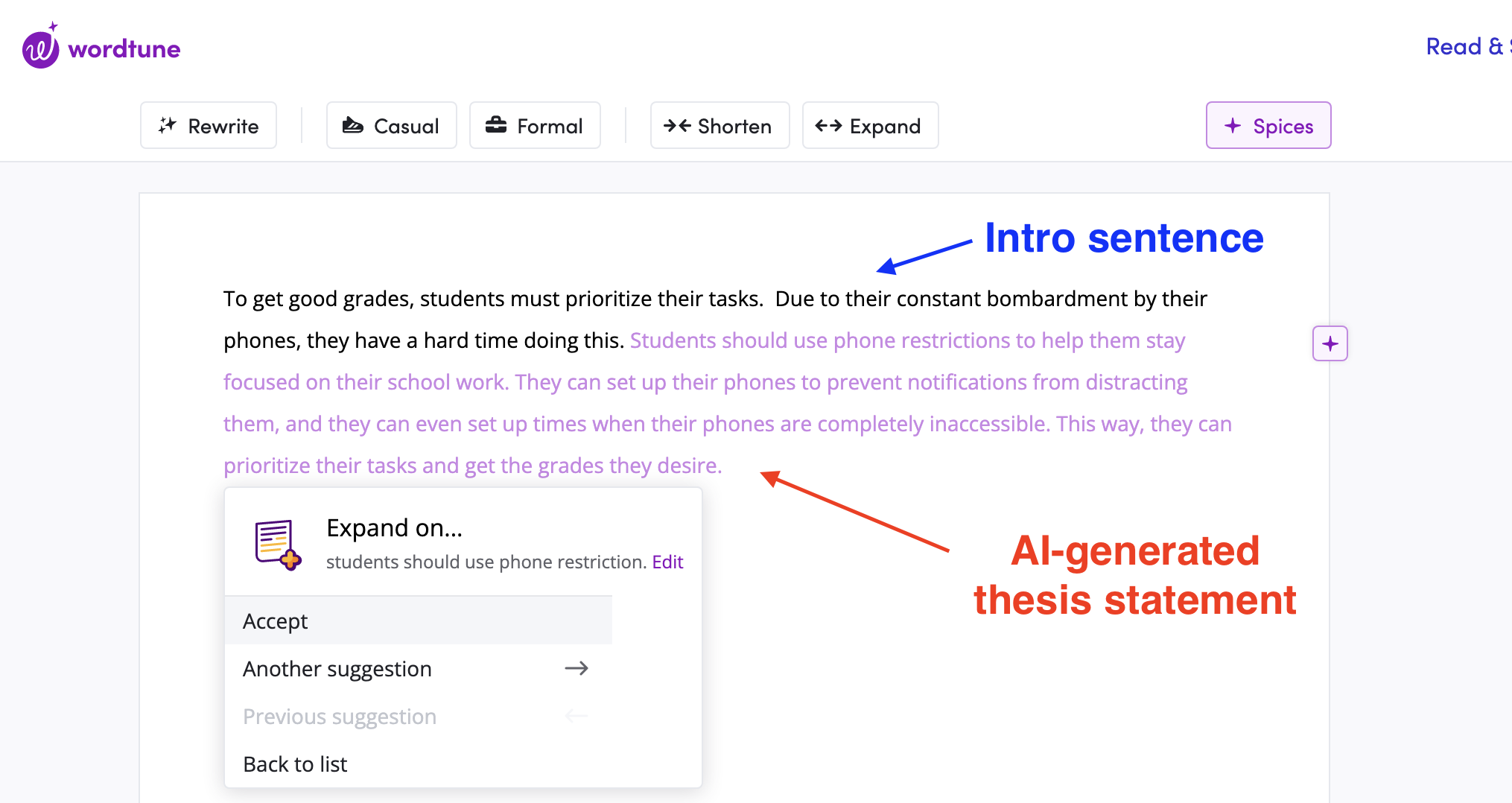
Different Kinds of Papers Need Different Kinds of Theses
How you compose your thesis will depend on the type of essay you’re writing. For academic writing, there are three main kinds of essays:
- Persuasive, aka argumentative
- Expository, aka explanatory
A persuasive essay requires a thesis that clearly states the central stance of the paper , what the rest of the paper will argue in support of.
Paper books are superior to ebooks when it comes to form, function, and overall reader experience.
An expository essay’s thesis sets up the paper’s focus and angle — the paper’s unique take, what in particular it will be describing and why . The why element gives the reader a reason to read; it tells the reader why the topic matters.
Understanding the functional design of physical books can help ebook designers create digital reading experiences that usher readers into literary worlds without technological difficulties.
A narrative essay is similar to that of an expository essay, but it may be less focused on tangible realities and more on intangibles of, for example, the human experience.
The books I’ve read over the years have shaped me, opening me up to worlds and ideas and ways of being that I would otherwise know nothing about.
As you prepare to craft your thesis, think through the goal of your paper. Are you making an argument? Describing the chemical properties of hydrogen? Exploring your relationship with the outdoors? What do you want the reader to take away from reading your piece?
Make note of your paper’s goal and then walk through our thesis-writing process.
Now that you practically have a PhD in theses, let’s learn how to write one:
How to Write (and Develop) a Strong Thesis
If developing a thesis is stressing you out, take heart — basically no one has a strong thesis right away. Developing a thesis is a multi-step process that takes time, thought, and perhaps most important of all: research .
Tackle these steps one by one and you’ll soon have a thesis that’s rock-solid.
1. Identify your essay topic.
Are you writing about gardening? Sword etiquette? King Louis XIV?
With your assignment requirements in mind, pick out a topic (or two) and do some preliminary research . Read up on the basic facts of your topic. Identify a particular angle or focus that’s interesting to you. If you’re writing a persuasive essay, look for an aspect that people have contentious opinions on (and read our piece on persuasive essays to craft a compelling argument).
If your professor assigned a particular topic, you’ll still want to do some reading to make sure you know enough about the topic to pick your specific angle.
For those writing narrative essays involving personal experiences, you may need to do a combination of research and freewriting to explore the topic before honing in on what’s most compelling to you.
Once you have a clear idea of the topic and what interests you, go on to the next step.
2. Ask a research question.
You know what you’re going to write about, at least broadly. Now you just have to narrow in on an angle or focus appropriate to the length of your assignment. To do this, start by asking a question that probes deeper into your topic.
This question may explore connections between causes and effects, the accuracy of an assumption you have, or a value judgment you’d like to investigate, among others.
For example, if you want to write about gardening for a persuasive essay and you’re interested in raised garden beds, your question could be:
What are the unique benefits of gardening in raised beds versus on the ground? Is one better than the other?
Or if you’re writing about sword etiquette for an expository essay , you could ask:
How did sword etiquette in Europe compare to samurai sword etiquette in Japan?
How does medieval sword etiquette influence modern fencing?
Kickstart your curiosity and come up with a handful of intriguing questions. Then pick the two most compelling to initially research (you’ll discard one later).
3. Answer the question tentatively.
You probably have an initial thought of what the answer to your research question is. Write that down in as specific terms as possible. This is your working thesis .
Gardening in raised beds is preferable because you won’t accidentally awaken dormant weed seeds — and you can provide more fertile soil and protection from invasive species.
Medieval sword-fighting rituals are echoed in modern fencing etiquette.
Why is a working thesis helpful?
Both your research question and your working thesis will guide your research. It’s easy to start reading anything and everything related to your broad topic — but for a 4-, 10-, or even 20-page paper, you don’t need to know everything. You just need the relevant facts and enough context to accurately and clearly communicate to your reader.
Your working thesis will not be identical to your final thesis, because you don’t know that much just yet.
This brings us to our next step:
4. Research the question (and working thesis).
What do you need to find out in order to evaluate the strength of your thesis? What do you need to investigate to answer your research question more fully?
Comb through authoritative, trustworthy sources to find that information. And keep detailed notes.
As you research, evaluate the strengths and weaknesses of your thesis — and see what other opposing or more nuanced theses exist.
If you’re writing a persuasive essay, it may be helpful to organize information according to what does or does not support your thesis — or simply gather the information and see if it’s changing your mind. What new opinion do you have now that you’ve learned more about your topic and question? What discoveries have you made that discredit or support your initial thesis?
Raised garden beds prevent full maturity in certain plants — and are more prone to cold, heat, and drought.
If you’re writing an expository essay, use this research process to see if your initial idea holds up to the facts. And be on the lookout for other angles that would be more appropriate or interesting for your assignment.
Modern fencing doesn’t share many rituals with medieval swordplay.
With all this research under your belt, you can answer your research question in-depth — and you’ll have a clearer idea of whether or not your working thesis is anywhere near being accurate or arguable. What’s next?
5. Refine your thesis.
If you found that your working thesis was totally off-base, you’ll probably have to write a new one from scratch.
For a persuasive essay , maybe you found a different opinion far more compelling than your initial take. For an expository essay , maybe your initial assumption was completely wrong — could you flip your thesis around and inform your readers of what you learned?
Use what you’ve learned to rewrite or revise your thesis to be more accurate, specific, and compelling.
Raised garden beds appeal to many gardeners for the semblance of control they offer over what will and will not grow, but they are also more prone to changes in weather and air temperature and may prevent certain plants from reaching full maturity. All of this makes raised beds the worse option for ambitious gardeners.
While swordplay can be traced back through millennia, modern fencing has little in common with medieval combat where swordsmen fought to the death.
If you’ve been researching two separate questions and theses, now’s the time to evaluate which one is most interesting, compelling, or appropriate for your assignment. Did one thesis completely fall apart when faced with the facts? Did one fail to turn up any legitimate sources or studies? Choose the stronger question or the more interesting (revised) thesis, and discard the other.
6. Get help from AI
To make the process even easier, you can take advantage of Wordtune's generative AI capabilities to craft an effective thesis statement. You can take your current thesis statement and try the paraphrase tool to get suggestions for better ways of articulating it. WordTune will generate a set of related phrases, which you can select to help you refine your statement. You can also use Wordtune's suggestions to craft the thesis statement. Write your initial introduction sentence, then click '+' and select the explain suggestion. Browse through the suggestions until you have a statement that captures your idea perfectly.

Thesis Check: Look for These Three Elements
At this point, you should have a thesis that will set up an original, compelling essay, but before you set out to write that essay, make sure your thesis contains these three elements:
- Topic: Your thesis should clearly state the topic of your essay, whether swashbuckling pirates, raised garden beds, or methods of snow removal.
- Position or angle: Your thesis should zoom into the specific aspect of your topic that your essay will focus on, and briefly but boldly state your position or describe your angle.
- Summary of evidence and/or argument: In a concise phrase or two, your thesis should summarize the evidence and/or argument your essay will present, setting up your readers for what’s coming without giving everything away.
The challenge for you is communicating each of these elements in a sentence or two. But remember: Your thesis will come at the end of your intro, which will already have done some work to establish your topic and focus. Those aspects don’t need to be over explained in your thesis — just clearly mentioned and tied to your position and evidence.
Let’s look at our examples from earlier to see how they accomplish this:
Notice how:
- The topic is mentioned by name.
- The position or angle is clearly stated.
- The evidence or argument is set up, as well as the assumptions or opposing view that the essay will debunk.
Both theses prepare the reader for what’s coming in the rest of the essay:
- An argument to show that raised beds are actually a poor option for gardeners who want to grow thriving, healthy, resilient plants.
- An exposition of modern fencing in comparison with medieval sword fighting that shows how different they are.
Examine your refined thesis. Are all three elements present? If any are missing, make any additions or clarifications needed to correct it.
It’s Essay-Writing Time!
Now that your thesis is ready to go, you have the rest of your essay to think about. With the work you’ve already done to develop your thesis, you should have an idea of what comes next — but if you need help forming your persuasive essay’s argument, we’ve got a blog for that.
Share This Article:
.webp)
How to Craft Your Ideal Thesis Research Topic

How to Craft an Engaging Elevator Pitch that Gets Results
.webp)
Eight Steps to Craft an Irresistible LinkedIn Profile
Looking for fresh content, thank you your submission has been received.
Experience a new era for PhD thesis writing and English editing
Sharpen your academic writing skills and deliver high-quality PhD thesis, dissertation, or essay writing for students

Paperpal It

Want smart tips and practical strategies to help you write and edit better, faster?

10 Ways to Detect AI Writing Without Technology
As more of my students have submitted AI-generated work, I’ve gotten better at recognizing it.

AI-generated papers have become regular but unwelcome guests in the undergraduate college courses I teach. I first noticed an AI paper submitted last summer, and in the months since I’ve come to expect to see several per assignment, at least in 100-level classes.
I’m far from the only teacher dealing with this. Turnitin recently announced that in the year since it debuted its AI detection tool, about 3 percent of papers it reviewed were at least 80 percent AI-generated.
Just as AI has improved and grown more sophisticated over the past 9 months, so have teachers. AI often has a distinct writing style with several tells that have become more and more apparent to me the more frequently I encounter any.
Before we get to these strategies, however, it’s important to remember that suspected AI use isn’t immediate grounds for disciplinary action. These cases should be used as conversation starters with students and even – forgive the cliché – as a teachable moment to explain the problems with using AI-generated work.
To that end, I’ve written previously about how I handled these suspected AI cases , the troubling limitations and discriminatory tendencies of existing AI detectors , and about what happens when educators incorrectly accuse students of using AI .
With those caveats firmly in place, here are the signs I look for to detect AI use from my students.
1. How to Detect AI Writing: The Submission is Too Long
When an assignment asks students for one paragraph and a student turns in more than a page, my spidey sense goes off.
Tech & Learning Newsletter
Tools and ideas to transform education. Sign up below.
Almost every class does have one overachieving student who will do this without AI, but that student usually sends 14 emails the first week and submits every assignment early, and most importantly, while too long, their assignment is often truly well written. A student who suddenly overproduces raises a red flag.
2. The Answer Misses The Mark While Also Being Too Long
Being long in and of itself isn’t enough to identify AI use, but it's often overlong assignments that have additional strange features that can make it suspicious.
For instance, the assignment might be four times the required length yet doesn’t include the required citations or cover page. Or it goes on and on about something related to the topic but doesn’t quite get at the specifics of the actual question asked.
3. AI Writing is Emotionless Even When Describing Emotions
If ChatGPT was a musician it would be Kenny G or Muzak. As it stands now, AI writing is the equivalent of verbal smooth jazz or grey noise. ChatGPT, for instance, has this very peppy positive vibe that somehow doesn’t convey actual emotion.
One assignment I have asks students to reflect on important memories or favorite hobbies. You immediately sense the hollowness of ChatGPT's response to this kind of prompt. For example, I just told ChatGPT I loved skateboarding as a kid and asked it for an essay describing that. Here’s how ChatGPT started:
As a kid, there was nothing more exhilarating than the feeling of cruising on my skateboard. The rhythmic sound of wheels against pavement, the wind rushing through my hair, and the freedom to explore the world on four wheels – skateboarding was not just a hobby; it was a source of unbridled joy.
You get the point. It’s like an extended elevator jazz sax solo but with words.
4. Cliché Overuse
Part of the reason AI writing is so emotionless is that its cliché use is, well, on steroids.
Take the skateboarding example in the previous entry. Even in the short sample, we see lines such as “the wind rushing through my hair, and the freedom to explore the world on four wheels.” Students, regardless of their writing abilities, always have more original thoughts and ways of seeing the world than that. If a student actually wrote something like that, we’d encourage them to be more authentic and truly descriptive.
Of course, with more prompt adjustments, ChatGPT and other AI’s tools can do better, but the students using AI for assignments rarely put in this extra time.
5. The Assignment Is Submitted Early
I don’t want to cast aspersions on those true overachievers who get their suitcases packed a week before vacation starts, finish winter holiday shopping in July, and have already started saving for retirement, but an early submission may be the first signal that I’m about to read some robot writing.
For example, several students this semester submitted an assignment the moment it became available. That is unusual, and in all of these cases, their writing also exhibited other stylistic points consistent with AI writing.
Warning: Use this tip with caution as it is also true that many of my best students have submitted assignments early over the years.
6. The Setting Is Out of Time
AI image generators frequently have little tells that signal the AI model that created it doesn’t understand what the world actually looks like — think extra fingers on human hands or buildings that don’t really follow the laws of physics.
When AI is asked to write fiction or describe something from a student’s life, similar mistakes often occur. Recently, a short story assignment in one of my classes resulted in several stories that took place in a nebulous time frame that jumped between modern times and the past with no clear purpose.
If done intentionally this could actually be pretty cool and give the stories a kind of magical realism vibe, but in these instances, it was just wonky and out-of-left-field, and felt kind of alien and strange. Or, you know, like a robot had written it.
7. Excessive Use of Lists and Bullet Points
Here are some reasons that I suspect students are using AI if their papers have many lists or bullet points:
1. ChatGPT and other AI generators frequently present information in list form even though human authors generally know that’s not an effective way to write an essay.
2. Most human writers will not inherently write this way, especially new writers who often struggle with organizing information.
3. While lists can be a good way to organize information, presenting more complex ideas in this manner can be .…
4 … annoying.
5. Do you see what I mean?
6. (Yes, I know, it's ironic that I'm complaining about this here given that this story is also a list.)
8. It’s Mistake-Free
I’ve criticized ChatGPT’s writing here yet in fairness it does produce very clean prose that is, on average, more error-free than what is submitted by many of my students. Even experienced writers miss commas, have long and awkward sentences, and make little mistakes – which is why we have editors. ChatGPT’s writing isn’t too “perfect” but it’s too clean.
9. The Writing Doesn’t Match The Student’s Other Work
Writing instructors know this inherently and have long been on the lookout for changes in voice that could be an indicator that a student is plagiarizing work.
AI writing doesn't really change that. When a student submits new work that is wildly different from previous work, or when their discussion board comments are riddled with errors not found in their formal assignments, it's time to take a closer look.
10. Something Is Just . . . Off
The boundaries between these different AI writing tells blur together and sometimes it's a combination of a few things that gets me to suspect a piece of writing. Other times it’s harder to tell what is off about the writing, and I just get the sense that a human didn’t do the work in front of me.
I’ve learned to trust these gut instincts to a point. When confronted with these more subtle cases, I will often ask a fellow instructor or my department chair to take a quick look (I eliminate identifying student information when necessary). Getting a second opinion helps ensure I’ve not gone down a paranoid “my students are all robots and nothing I read is real” rabbit hole. Once a colleague agrees something is likely up, I’m comfortable going forward with my AI hypothesis based on suspicion alone, in part, because as mentioned previously, I use suspected cases of AI as conversation starters rather than to make accusations.
Again, it is difficult to prove students are using AI and accusing them of doing so is problematic. Even ChatGPT knows that. When I asked it why it is bad to accuse students of using AI to write papers, the chatbot answered: “Accusing students of using AI without proper evidence or understanding can be problematic for several reasons.”
Then it launched into a list.
- Best Free AI Detection Sites
- My Student Was Submitting AI Papers. Here's What I Did
- She Wrote A Book About AI in Education. Here’s How AI Helped
Erik Ofgang is a Tech & Learning contributor. A journalist, author and educator, his work has appeared in The New York Times, the Washington Post, the Smithsonian, The Atlantic, and Associated Press. He currently teaches at Western Connecticut State University’s MFA program. While a staff writer at Connecticut Magazine he won a Society of Professional Journalism Award for his education reporting. He is interested in how humans learn and how technology can make that more effective.
What Is Blooket And How Does It Work? What's New?
Best Apps and Sites for Augmented Reality
The Importance of AI Acceptance in Education
Most Popular
- AI Content Shield
- AI KW Research
- AI Assistant
- SEO Optimizer
- AI KW Clustering
- Customer reviews
- The NLO Revolution
- Press Center
- Help Center
- Content Resources
- Facebook Group
Rewriting Thesis with AI: A Creative & Professional Solution
Table of Contents
Have you been tasked by your supervisor with rewriting thesis ?
Rewriting a Thesis Can Be Daunting
Various academic pursuits involve writing a thesis. These include:
- Getting a master’s degree
- A taught course
- Gaining a Ph.D.
- Maintaining a long-term research position
Unfortunately, thesis writing is a time-consuming process that requires a lot of effort and diligence on the part of the student. Indeed, redrafting a thesis paper can be a very challenging and very tedious task.
However, professional writers undergo this process every day.
Many students find themselves revising and rewriting their thesis , without having the slightest idea of how to do it. Also, original manuscripts of great authors often have several scribbles and cross-outs — a sign of several rewrites.
You might end up rewriting your thesis just to be met with a whole series of problems.
However, artificial intelligence can take your current thesis or working paper and enhance the process. It will make your content much more accessible and ultimately more representative of your research.
Professional thesis editing programs can also be used, which makes thesis writing quicker, more accurate, and affordable.
Why Do You Need to Rewrite a Thesis
Rewriting a dissertation or thesis involves taking the time to make corrections suggested by the supervisor. It also includes removing plagiarism, refining the format and course of thought, and presenting the results in a simplified and understandable manner.
For this procedure, it is necessary to assess the reasons for rewriting and the types of changes needed.
The primary purposes of rewriting a thesis are as follows:
- Clarify the main idea of the thesis to the reader.
- Fix the errors suggested by the supervisor
- To avoid any sort of plagiarism
- Reduce redundancy and repetition
- Restructure the content to improve readability
- Add new material, facts, and figures
- Remove irrelevant information
- Make final adjustments to grammar
The purpose of rewriting thesis or dissertation is to improve readability and to make it easier for the reader to understand your chapter.
Rewriting Thesis Is Made Easy Using AI Writing Services
Writing may seem like a straightforward process to many, but it can be a tedious and time-consuming task. It can be difficult to find the time to think critically and work on your thesis.
This is where AI comes in — a creative and time-saving solution to rewriting a thesis.
AI recognizes the basic formatting structures of the dissertation, eliminating the need for extensive rewriting. It produces error-free drafts, even those containing difficult concepts, complex sentences, and complex passages.
Moreover, AI shortens the process because it will synthesize work you did in the past and then instantaneously do the necessary research and citations. This creative tool allows you to spend your time on the creative content only. When AI finishes its assignment, you’ll have a top-notch thesis paper to show for it.
With AI, you can write a good thesis that does not need the writer to rewrite the whole thesis in every detail. However, be mindful that AI is not a superior writer. Any manuscript that goes through AI’s rewriting services must undergo revision by a pair of human eyes.
We all know that rewriting a paper is a daunting task. But now, the process can be made easier with the help of AI-generated writing services.
Rewriting with AI can help with everything from grammar and formatting to ensuring clearer sentences. It also makes sure the introduction contains enough material to cover the whole idea of the topic. AI thesis rewriting is an invaluable resource to students and scholars who might not be as proficient with the English language.
You just have to figure out the scope and structure of your paper. AI rewriting ensures that the content is sound, concise, and concise.

Pam is an expert grammarian with years of experience teaching English, writing and ESL Grammar courses at the university level. She is enamored with all things language and fascinated with how we use words to shape our world.
Explore All Rewrite Articles
Best rewriting tools for rewriting essays.
Every day, a writer faces the task of coming up with new thoughts and words. Although rewriting an existing document…
How to Rewrite Informal to Formal Text
Torewrite informal to formaltext, you need to find a suitable replacement for the informal words. The second step is to…
Changing Sentences in English: Types of Transformations
Experienced writers use a variety of sentence structures and styles to engage the readers and incorporate diversity in writing. Combining…
Top 5 Article Writer Software for You
It can be exhausting if you need to regularly produce high-quality content for publishing. Writing unique content on similar ideas…
How To Rewrite Sentences Using Direct Speech?
In many instances, we need to describe an event or action and repeat what someone said. It is possible to…
Parallel Structure in Writing: an Ultimate Guide
Errors in parallelism are grave because they hamper communication and leave readers bewildered. When writers, lecturers, and knowledge workers fail…
- Share full article
Advertisement
Subscriber-only Newsletter
The Ethicist
Can i use a.i. to grade my students’ papers.
The magazine’s Ethicist columnist on artificial intelligence platforms, and whether it’s hypocritical for teachers to use these tools while forbidding students from doing the same.

By Kwame Anthony Appiah
I am a junior-high-school English teacher. In the past school year, there has been a significant increase in students’ cheating on writing assignments by using artificial intelligence. Our department feels that 13-year-old students will only become better writers if they practice and learn from the successes and challenges that come with that.
Recently our department tasked students with writing an argumentative essay, an assignment we supported by breaking down the process into multiple steps. The exercise took several days of class time and homework to complete. All of our students signed a contract agreeing not to use A.I. assistance, and parents promised to support the agreement by monitoring their children when they worked at home. Yet many students still used A.I.
Some of our staff members uploaded their grading rubric into an A.I.-assisted platform, and students uploaded their essays for assessment. The program admittedly has some strengths. Most notable, it gives students writing feedback and the opportunity to edit their work before final submission. The papers are graded within minutes, and the teachers are able to transfer the A.I. grade into their roll book.
I find this to be hypocritical. I spend many hours grading my students’ essays. It’s tedious work, but I feel that it’s my responsibility — if a student makes an effort to complete the task, they should have my undivided attention during the assessment process.
Here’s where I struggle: Should I embrace new technology and use A.I.-assisted grading to save time and my sanity even though I forbid my students from using it? Is it unethical for teachers to ask students not to use A.I. to assist their writing but then allow an A.I. platform to grade their work? — Name Withheld
From the Ethicist:
You have a sound rationale for discouraging your students from using A.I. to draft their essays. As with many other skills, writing well and thinking clearly will improve through practice. By contrast, you already know how to grade papers; you don’t need the practice.
What matters is whether an A.I.-assisted platform can reliably appraise and diagnose your students’ writing, providing the explanation and guidance these students need to improve. In theory, such tools — and I see that there are several on the market, including from major educational publishers — have certain advantages. The hope is that they can grade without inconsistency, without getting tired, without being affected by the expectations that surely affect those of us who hand-grade student work.
I notice you haven’t raised concerns about whether the platform provides reliable assessments; you’ll have to decide if it does. (If it isn’t quite up to snuff, it might become so in a year or two, so your question will persist.) Provided the platform does a decent job of assessment, though, I don’t see why you must do it all yourself. You should review the A.I.-annotated versions of your students’ writing, check that you agree with the output, and make notes of issues to bring up in class. But time saved in evaluating the papers might be better spent on other things — and by “better,” I mean better for the students. There are pedagogical functions, after all, that only you can perform.
In sum: It’s not hypocritical to use A.I. yourself in a way that serves your students well, even as you insist that they don’t use it in a way that serves them badly.
Readers Respond
The previous question was from a reader who asked about professional boundaries. He wrote: “I am a retired, married male psychiatrist. A divorced female former patient of mine contacted me recently, 45 years after her treatment ended. Would it be OK to correspond with her by email? Or is this a case of ‘once a patient, always a patient?’”
In his response, the Ethicist noted: “The relevant professional associations tend to have strictures that are specifically about sexual relationships with former patients. … In light of the potential for exploitation within the therapist-patient relationship, these rules are meant to maintain clear boundaries, protect patient welfare, uphold the integrity of the profession and eliminate any gray areas that could lead to ethical breaches. But though you do mention her marital status, and yours, you’re just asking about emailing her — about establishing friendly relations. The question for you is whether she might be harmed by this, whether whatever knowledge or trust gained from your professional relationship would shadow a personal one. Yes, almost half a century has elapsed since your professional relationship, but you still have to be confident that a correspondence with her clears this bar. If it does, you may email with a clear conscience.” ( Reread the full question and answer here. )
As always, I agree with the Ethicist. I would add that the letter writer’s former patient doesn’t realize that the therapist is actually two different people — the professional and the regular person underneath. Therapists portray their professional selves to their clients. The former client may be disappointed upon meeting the therapist outside of the professional context. Additionally, the feelings she has toward the therapist may be based on transference, and they would need to address that. — Annemarie
I am a clinical psychologist. While the Ethicist’s description of professional ethical boundaries is correct, there is more to the story, and I disagree with his conclusion. A very big question here is why this former patient contacted him after 45 years. That is a question that is best explored and answered within the context of a therapeutic relationship. He would be well- advised to respond in a kind and thoughtful way to convey the clear message that he is not available for ongoing communication, and he should suggest that she consult with another therapist if she feels that would be helpful. — Margaret
In my case, it was the therapist who reached out to me, seeking to establish a friendship several years after our sessions ended. I was surprised, but he shared that he had since experienced a similar personal tragedy to one I had explored with him in sessions. Since it had been several years since we saw each other professionally, I responded. There was never any hint of romantic or sexual interest. Still, as he continued to reach out to me, clearly desiring a friendship, it never felt right to me. It did feel unprofessional, as his knowledge of me was borne out of a relationship meant to be professional, never personal, as warmly as we might have felt during our sessions. I ended up being disappointed in him for seeking out my friendship. — Liam
I am a (semi)retired psychiatrist who has been practicing since 1974. In my opinion, “once a patient, always a patient” is correct. Establishing any type of personal relationship with a former patient could undo progress the patient may have made in treatment, and is a slippery slope toward blatantly unethical behavior. As psychiatrists, our responsibility is to work with patients in confronting and resolving issues that are preventing them from having a reality-based perception of their life. With such an outlook, they are more capable of establishing satisfying relationships with others. An ethical psychiatrist is not in the business of providing such satisfaction to his or her patients. — Roger
I think there is a difference between being friendly and being friends with a former client. As someone who used to attend therapy with a therapist I think dearly of, she made it clear to me that it was OK to send her emails with life updates after our therapeutic relationship ended. But beyond that, I think it would be inappropriate and uncomfortable to pursue a friendship with her, and vice versa, because of the patient-provider relationship that we previously had and the power dynamic that existed between us. The letter writer didn’t share the content of the email his former patient sent to him, but if it’s just a friendly life update, I think it’s fine to write back and thank her for sharing. Beyond that, I feel like it would be unprofessional to meet or pursue a deeper relationship. — Meghan
Kwame Anthony Appiah is The New York Times Magazine’s Ethicist columnist and teaches philosophy at N.Y.U. His books include “Cosmopolitanism,” “The Honor Code” and “The Lies That Bind: Rethinking Identity.” To submit a query: Send an email to [email protected]. More about Kwame Anthony Appiah

IMAGES
VIDEO
COMMENTS
Justdone. JustDone is an AI for thesis writing and content creation. It offers a straightforward three-step process for generating content, from choosing a template to customizing details and enjoying the final output. AI for thesis writing - Justdone. JustDone AI can generate thesis drafts based on the input provided by you.
Our Commitment: Academic Honesty. Jenni AI is committed to upholding academic integrity. Our tool is designed to assist, not replace, your effort in research and writing. We strongly discourage any unethical use. We're dedicated to helping you excel in a responsible and ethical manner.
TextCortex ensures continuous assistance, providing a 24/7 supported widget to send an email. 7. Writesonic - Best for Advanced AI Thesis Writing with GPT-4 Technology. Writesonic stands out in the AI writing tool arena, making it an excellent choice for advanced AI thesis writing with GPT-4 technology.
With AI as your research assistant, you can navigate the vast sea of scientific research with ease, uncovering citations and focusing on academic writing. ... Together, these AI tools are pioneering a new era of efficient, streamlined scientific writing. Jenny.AI - https://jenni.ai/ (20% off with code ANDY20) Yomu - https://www.yomu.ai;
Alternatives include pasting a summary of the literature or using Claude.ai — a similar tool to ChatGPT that can handle ~20x the text input. 3. Research Proposal. ... Using detailed prompts in every stage of the thesis process — including research, data collection and analysis, and writing your thesis — can help you with a lot of the work ...
An AI might write a thesis, but it won't write your thesis. As you'll learn in the first year seminar, while it's important to write coherently, it's still more important to ask good questions, read critically, and respond to feedback —- all things that AI can't (yet) do.
2. Genei. Best for Summarizing ($15.99/month). Genei has established itself as a prominent player in the realm of academic AI tools, and rightfully so. As a comprehensive tool designed for academics, Genei goes beyond assisting with workflow organization and document storage—it also offers a plethora of features tailored specifically for academic writing.
AI writing tools can be used to generate potential research questions or research paper outlines. You can then refine the tool's responses by further prompting it or directly editing the output yourself to ensure the result makes sense and fits your requirements. ... Using AI tools to generate a paper, thesis, or dissertation, for example ...
Improve your writing with AI. Improve your academic performance and write like a pro without cheating or jeopardizing your degree. Get access to free AI writing tools, useful ChatGPT prompts, the latest articles about AI, and more. Start writing.
Artificial intelligence (AI) has become a valuable asset in the thesis writing process. AI tools can assist you in various stages, from research to writing and editing.
It will further discuss how this dedicated AI-based tool can assist researchers to resolve the longstanding challenge of communicating their thesis in a grammatically correct and scientifically structured manner. Three stages of Writing: Planning, Writing, and Editing. Structure of a Thesis - Types and Important Sections.
1. Semantic Scholar. AI-powered Academic Search Engine. Most people know about Google Scholar: the power of Google applied to research papers. If you're doing any form of scientific research though, you might want to give Semantic Scholar a go. This AI-powered search and discovery tool allows you to stay up to date with more than 200 million ...
As a bonus, Microsoft Edge's AI-powered tools check for grammar and spelling errors and provide suggestions to improve the clarity of your writing. If you like writing chunks of your paper as you research, this is ideal. They can help refine your writing style and ensure your ideas are effectively communicated. Finding sources using AI.
Here are six tips to help make the essay writing process easier. Write better essays with AI >. . 1. Create a stronger thesis statement using AI. A thesis statement helps you stay on-track with your essay's overall aim. It's a brief statement that summarizes what your essay is about and what readers can expect.
The title of the thesis I wanted to develop is this: Online Learning in the Age of AI: Challenges and Promises. The introductory chapter I have generated through AI's ChatGPT comes in 14 double ...
Jenni AI = ChatGPT x 10. Love this use of AI to assist with, not replace, writing! Keep crushing it @Davidjpark96 💪. 4/9 Jenni AI's Outline Builder is a game-changer for organizing your thoughts and structuring your content. Create detailed outlines effortlessly, ensuring your writing is clear and coherent.
The thesis should make a unique contribution to the topic, showcasing the writer's deep understanding and personal interpretation of the subject. The best AI writing tools for academic writing can help ensure originality in your thesis statement. Alignment with the Paper. A thesis statement must be in harmony with the rest of the paper.
Once you have a clear idea of the topic and what interests you, go on to the next step. 2. Ask a research question. You know what you're going to write about, at least broadly. Now you just have to narrow in on an angle or focus appropriate to the length of your assignment.
Paperpal, a trusted AI writing assistant, transforms academic writing for students with real-time English editing tips from the first draft itself. Move closer to your goals when you improve your language and grammar, enhance your writing style, and ensure overall clarity with our subject-specific writing and editing recommendations.
Even ChatGPT knows that. When I asked it why it is bad to accuse students of using AI to write papers, the chatbot answered: "Accusing students of using AI without proper evidence or understanding can be problematic for several reasons." Then it launched into a list. Best Free AI Detection Sites; My Student Was Submitting AI Papers. Here's ...
Using AI writing tools (like ChatGPT) to write your essay is usually considered plagiarism and may result in penalization, unless it is allowed by your university. Text generated by AI tools is based on existing texts and therefore cannot provide unique insights. Furthermore, these outputs sometimes contain factual inaccuracies or grammar mistakes.
Using AI To Aid Writing Gains. There's lots that can be done to fix this problem: Improved teacher professional development, greater emphasis on writing across the curriculum, etc. For my part ...
Step 1: Start with a question. You should come up with an initial thesis, sometimes called a working thesis, early in the writing process. As soon as you've decided on your essay topic, you need to work out what you want to say about it—a clear thesis will give your essay direction and structure.
This creative tool allows you to spend your time on the creative content only. When AI finishes its assignment, you'll have a top-notch thesis paper to show for it. With AI, you can write a good thesis that does not need the writer to rewrite the whole thesis in every detail. However, be mindful that AI is not a superior writer.
What matters is whether an A.I.-assisted platform can reliably appraise and diagnose your students' writing, providing the explanation and guidance these students need to improve. In theory ...